While Dallas was successful in landing nine matches to host in the 2026 World Cup, its bid to host the Final match was ultimately rejected, which many pundits have suggested is due to the lack of a widespread public transportation system.


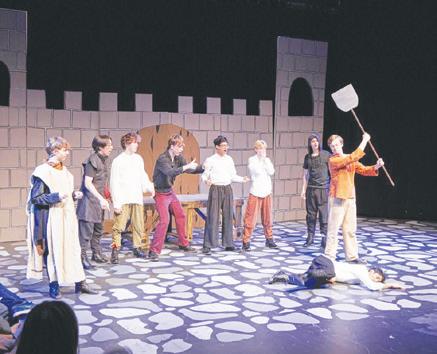

ReMarker Volume 70, Issue 5 • St. Mark’s School of Texas • Friday, March 8, 2024 Issues 3 Academics 10 Life 15 Focus 16 Reviews 22 Editorials 23 Sports 26 Inside Scan to visit the ReMarker website Check out other Web Exclusive stories including: In-depth International Week coverage Senior sports commitment updates Wood and Metal begins senior projects On the Web Marksmen and Hockadaisies performed Spamalot, a parody of “Monty Python and the Holy Grail,” Feb. 16-18. Successful Spamalot Show TROUBLE WITH TRANSIT and so much more. PHOTO / ZACHARY BASHOUR
SEE TRANSPORTATION PAGE 4
An ode to the car ride
 Noah Cathey Design Director
Noah Cathey Design Director
There are few experiences like a car ride.
Everywhere I go, I feel bombarded by current events, political chaos, social downturn and the like. Between social media and the reach of the press, it’s nearly impossible to avoid what is going on in the world.
The car ride is different. It’s just you and the person sitting next to you. You can listen to whatever you like, set the temperature to whatever you want.
It’s the last version of true isolation from the world around you. The only other frame of reference you have for human life are the cars zipping by you on the left and the ones you pass on the right. From point A to point B, it is your little bubble.
And there is no person I would want in my little bubble more than my dad.
I’ve ridden with my dad more than anyone else on Earth. Going to Washington D.C., we rode to school together for the first six years of my primary education. Every competition and tournament I took part in, he drove me there and back. Because we are the only two morning people in our house, he’s usually the default to take me somewhere. Between Mavs camps in the summer and Mavs games in the winter, my dad and I have driven all across this city —our city— together.
Because I live on the other side of the Interstate-30, we’ve gone through and above downtown Dallas a lot. I’ve watched the world around me change sitting next to my dad, I’ve seen beloved buildings torn down, new ones erected in their place. We now drive on highways that didn’t exist when we started these journeys 15 years ago.
Over the years, I’d like to think that we’ve both grown and coversations have increased in quality. And while that is true in some cases, they’ve largely stayed the same. There is always a version of “Game seven, up one, bases loaded and you need a out, who you got?” or “Pick your starting five for the Final Four - one and dones only.” The mainstays used to be Jayson Stark trivia on Mike & Mike in the morning and Randy Galloway on the way home. Now, the Mad-Minute Prank Call on K104 and the Mavs postgame show are in the place (only if the Mavs win, though.) But the highlight (or lowlight) of our car rides was always the post-game talk.
When my basketball season ended a month ago in the SPC Final, I cried on the floor with my teammates because I was sad that my career was over. I would never play competitive basketball again, and I felt the weight of that.
I cried on the bus ride back to Dallas because I realized I would never get to ride with my dad after a game again.
In the 16 years I’ve played basketball, every post game conversation was the same. I got Coach Cathey for the first half of the ride and my dad for the second half, usually with I-30 being the line of demarkation. We talk about each game, win or lose, with the same uncanny realness each time.
In a few months, I’ll be hours away from home. I won’t be able to listen to my dad say “What you know about this?” or argue why Ray Allen is better than Klay Thompson.
And I’m going to miss it.

25 I’m off the pill
Will Clifford discusses the impact of the adderall shortage.
16 Living in the moment
How do you balance stress and the fear of missing out?

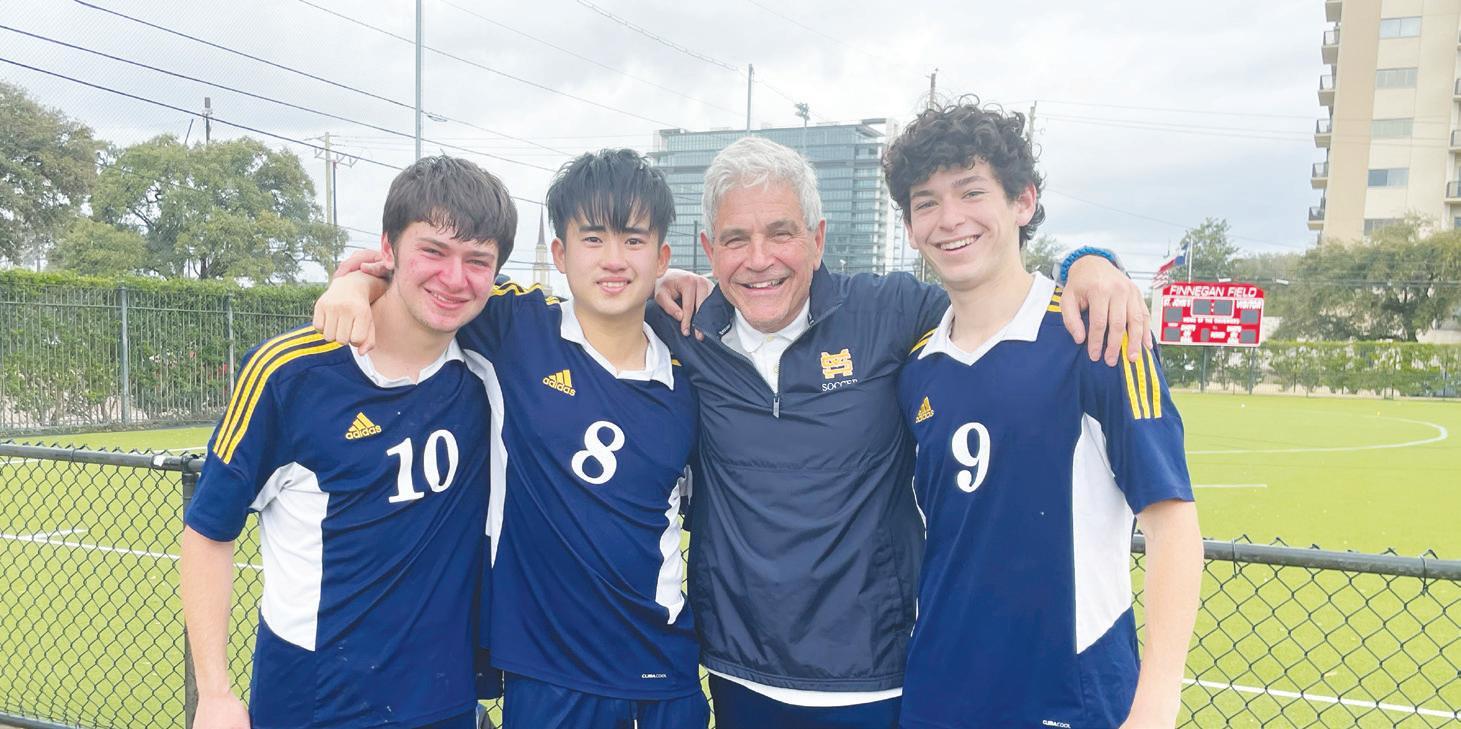
03
Making your voice heard
The importance of voting — especially in the March primary elections
18 Playing against each other?
Intermurals in the senior, sophomore and freshman class take campus by storm
IN BRIEF
COMMUNITY SERVICE The second five-hour community service hour deadline was Feb. 5. The next and final service hour deadline is April 8. Students should upload any hours earned to MobileServe. Should students be interested, the Presidential Service Award hour deadline is May 1. The Upper School Spring Basket Drive will take place from March 4 to March 25, and the Middle School Spring Basket Drive will run from March 7 to March 21. For any questions about the Spring Basket Drive, contact Maddox Canham.
07 Darkness during the day
A preview of the Solar Eclipse coming to Dallas on Monday, April 8
21 Same name. Same stardom. Seniors Winston Miller and Miller Wendorf dazzle in the world of fine arts
30 Hanging up the boots
Coach Corindo Martin steps away from Lions soccer.
12 A pandemicsized gap
The long-term social effects of the pandemic isolation period
28 Changing it up
The complexity that is involved in switching from one sport to another
Year-themed assembly and chapel were put on for students in February. The Lunar New Year chapel featured new decorations and a visiting artist who performed a traditional Chinese anthem.
The Lunar New Year Assembly performances included a traveling Kung-Fu group, the Lion Dance performed by the senior Chinese class and a performance by the Guinness World Record Holder for foot juggling.
EVENSONG On March 2 The Upper School Choir hosted an Evensong at 7 p.m., a chance for members of the school’s community to come together and lis-
ten to the choir. It was a required performance for junior and senior choristers, but it is optional for both freshmen and sophomores. Following this performance, the entire choir, including all Middle School and Upper School choiristers will sing on April 21.
BASEBALL With spring sports getting into gear, the Lions baseball team looks to continue its strong start this year after a disappointing season last year. The varsity baseball team, led by senior captains Alex Barrett, Mitchell Galardi and Grayson Redmond traveled to Shelton on Friday, Feb.
16 coming home with a 12-3 win. On Feb. 20, the Lions took on TACA at home and earned yet another win with a final score of 3-1. After wins at Bishop Lynch and in the Hillcrest tournament, the Lions sit at 4-2.
ALUMNI UPDATE In his first year at the University of North Carolina, Harrison Ingram ‘21 is averaging career highs in points, rebounds and steals and playing a critical role in the team’s top 10 ranking. As college lacrosse season approaches, Ian Williams Henry Boykin and Jake Park, all graduates of the class of 2023 look to play their first NCAA minutes.
Bulletin
NEW YEAR
LUNAR
A Lunar New
I ns I de | R e M a R ke R Friday, March 8, 2024 | P age 2 Cathey’s Column

Watches keep athletes on track
Several members of the community use digital watches like Fitbits and Apple Watches to track their fitness. But readings from these trackers are frequently inaccurate. Users discuss the role these fitness trackers play in their daily lives.
By Hilton Sampson and Kayden Zhong
He was exhausted. He’d skied for the entire day. Cycled 50 miles on the Peloton. Lifted weights late into the night. And now, he had finally done it.
Looking down at his Apple Watch, junior Henry Sun saw his daily health statistics blink onto the screen. His activity rings were completely filled out, but more importantly, he now had the top spot among his group of friends.
He smiled, and then promptly fell asleep.
Sun and his friends are part of an ever-increasing group of athletes who dedicate their attention to accumulating high activity scores based on metrics set by digital workout trackers, such as the Apple Watch or the Fitbit.
Known as the “gamification” of fitness, the phenomenon has been controversial.
Some studies have shown a positive correlation between the usage of the devices and average time spent exercising; other studies, however, have also shown that the calorie tracking features can be frequently inaccurate.
While critics argue that elaborate designs and fancy user interfaces make no real long term impact on an individual’s health, Sun is optimistic that these features will attract people to the devices and, in turn, help them develop healthy habits.
“If it helps people get more educated about working out and get more motivated, I think that's a very good thing,” Sun said.
Sun has found certain metrics on the device that make tracking workout performance easier. Tracking heart rate zones while running, for example, gives him a range of target output he can measure, helping him to gauge the strain of his runs. Sun also has used the active calorie measurement, an estimation of the calories burned each day through physical activity, to help him safely cut weight during wrestling season.
After a little experience using the device to track performance in various workouts and guided activities, Sun believes that users will have enough knowledge to stay fit on their own.
“Once you get to higher levels, you don’t really lose interest in keeping up with the statistics,” Sun said. “You just don’t really need it anymore because you already know you can finish your workout and know you did it well.”
Sun stopped using his Apple Watch in the spring of 2022, at the start of baseball season, after realizing it was hard to keep track of his fitness data when he couldn’t wear the device while playing.
Sun tested out an alternative fitness tracker, the Whoop, a screenless device providing data to a user’s mobile phone with measurements of physical strain, sleep performance and recovery data.
“Having used both,” Sun said, “the Whoop is definitely more geared towards athletes that are in sports. I would wear it during wrestling because I could wear it on my ankle. If you wear it on your ankle, there’s really not a sport you can’t do.”
This ability to track data during any kind of physical activity makes the Whoop a popular tracker for all kinds of athletes. But for Sun, the Apple Watch just makes things easier when he’s not playing a sport, leading him back to his original device.
“It gives you a lot more insight into things and makes tracking your workouts and looking at all the information a lot easier,” Sun said. “I think that the Apple Watch interface and the user experience is a lot better.”
During his daily morning runs, chemistry instructor and Middle School cross country and track coach Dr. Jonathan Moody uses tracking watches to log his mileage, heart rate and calories, though he doesn’t always use the data.
“I’ve always had some version of a Garmin,” Moody said. “I actually use a different heart monitor that has a strap on my forearm, however, because sometimes, when you’re running, the watch can start picking up your cadence, and then the report will jump up. Also, when they tell you how many calories you’ve burned, it’s just an estimation, but it’s still nice to have some information like that.”
Moody believes that the tracking devices can be helpful, though he recognizes the dangers of being overdependent on the numbers they show.
“If you know how fit you are but you’re just having
a bad day in a workout, sometimes athletes will push harder than they should just because they look down at their tracking device and it tells them that they’re going slower than they normally would,” Moody said. “So even though I have my watch on the whole time I’m running, I often won’t look down for miles at a time.”
If he knows an athlete is prone to being distracted or comparing themselves to others, Moody tells them to try exercising without the watch.
“In all aspects of social media these days, we’re constantly bombarded with what someone else looks like or what someone else wears or buys, and a lot of people have this, almost irresistible, urge to go, ‘I want that’ or ‘I want to do that,’” Moody said. “That can extend to training as well. If you see a guy that beats you in a race, and then you start seeing what his workouts are, it’s not always safe to assume that you should do the same workouts as him. And even if you do the same workouts the same way, you still might not be as good or be able to beat him.”
TRACKING SATISFACTION
Statistics from BMC Public Health on user experience with activity trackers of users valued the real-time feedback from their device
5-7 months
70%
the average duration of usage of the device
89% of users experienced technical difficulties with their device
GRAPHIC / JOSHUA GOFORTH
Friday, March 8, 2024 R e M a R ke R Page 3
CAUGHT IN THE CYCLE Athletes training with fitness trackers can often get caught up in the daily goals provided by their devices, sometimes leaving them feeling pressured to meet the metrics.
Demystifying DFW Transportation
With the 2026 World Cup bids putting city transit under the spotlight, the misconceptions about the area’s options have been in discussion. Here’s a look into the DART system, its history and current available options for patrons.
By Zack Goforth, Grayson Redmond and Will Clifford
For those in a tucked-in oxford shirt, grey shorts and — can’t forget — a belt, many are fortunate enough to look forward to a set of wheels after finally passing that driver’s test.
But driving is not necessarily the norm in many parts of the world, or even the United States. A distinct hallmark of various countries in Europe and Asia, and even in cities like New York and Chicago, is a well-developed and accessible public transportation system.
And when it was announced in February that Arlington’s AT&T Stadium, despite hosting nine other matches, had not landed the coveted bid for the World Cup Final, which will instead be hosted at MetLife Stadium in East Rutherford, New Jersey, many have begun pry at the backbone of Dallas-Fort Worth’s own public transportation system as a possible reason for the decision.
Additionally, with spring break around the corner — a time for Marksmen relatives from other cities and countries to come visit Dallas — many may find themselves shocked at the sheer number of cars and the difficulty of mass transit.
So in a metroplex where less than 5 percent of households were without a car as of 2018, has a city so intertwined with automotive freedom left those in need of safe and accessible public transportation behind?
Before junior Teddy Fleiss received his driver’s license, he took the Dallas Area Rapid Transit (DART) bus home from school most days, which he saw as a viable alternative to waiting hours for his parents.
anything to worry about; I never really felt unsafe or anything.”
Fleiss’ feeling of security may be a result of DART’s recent efforts to emphasize rider safety, according to DART Chief Communications Officer Jeamy Molina.
“Since our new CEO Nadine Lee came on board, she has worked to make sure that cleanliness, safety and reliability are in our DNA,” Molina said. “We’ve taken a lot of steps to make sure that we’re providing a safe ride, such as by increasing our police department staff — we’ve added 100 transit security officers to the system. We also recently added a program called DART Cares, a multidisciplinary response program in partnership with Parkland Hospital, where we have paired a DART police officer, a paramedic and a social worker from Parkland to help with the unhoused on our system.”
Molina also claims that DART is now more accessible than ever.
“I think there’s a lack of awareness for how easy it is to access our system,” Molina said. “We have the largest light rail system in the nation at 93 miles. We cover 13 cities across DFW. We’ve increased the capacity of our bus routes to allow for more options. We have the GoLink option now, which essentially helps you get that last mile to and from a station.”
However, former Dallas mayor Ron Kirk acknowledges that DART’s expansion has not always been without detours.
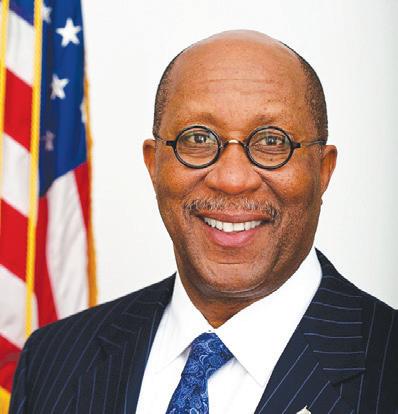
Hon. Ron
“My dad worked and my mom was always busy when school got out,” Fleiss said, “so I took the DART bus home. I used to live in Los Angeles, and all the schools there had buses to take kids to and from school, so my parents weren’t used to driving me. The bus was pretty convenient for me, because the stop is right outside the school, and there was never really

“I helped open DART’s first rail line as mayor in 1995,” Kirk said, “and from the get-go there were challenges. Some people opposed the rails because they were ‘ugly,’ and there was a sense that if you bring these trains into North Dallas, you bring along ‘undesirable people,’ and they’re going to flood the neighborhoods, so they killed a lot of the rail lines, and it wasn’t until they were built that people saw the success.”
To this day, DART suffers from a lack of state funding, according to Kirk.
“We still have very little money from the state,” Kirk said. “So DART’s expansion is largely self-funded by member cities or supported by funding from the US Department of Transportation.”

The question of whether DFW’s public transportation system had anything to do with the decision to place the World Cup finals in the New York area over AT&T Stadium has a simple answer, according to FC Dallas President and Chairman of the Dallas 2026 World Cup bid Dan Hunt ‘96, who helped bring nine tournament matches to the city for 2026.
“The perspective of Dallas’ public transportation system had zero impact on the bid,” Hunt said. “It really came down to the perception of New York being New York. But we let FIFA know what the reality of Dallas is — we aren’t just a big city in the United States anymore — Dallas is now a global city and this World Cup helps validate that.”
“ARLINGTON IS THE LARGEST CITY IN AMERICA WITH NO MONEY COMMITED TO PUBLIC TRANSPORTATION. THEY DON’T EVEN HAVE A BUS SYSTEM
- Ron Kirk
According to Hunt, DFW’s car-centric culture has even caused FIFA to rethink previous assumptions.
“FIFA has said to me that (DFW) presented as good of a traffic and transportation plan as they saw in any of the big cities in North America,” Hunt said. “We also are causing FIFA to rethink the revenue opportunities that exist between the driving and tailgating culture — the economics of it that brings parking, merchandising and food and beverage revenue. So what was perceived as a negative at the very beginning became a major plus for a lot of the stadiums in the North American bid that can park cars.”
But Kirk maintains that the city of Arlington was possibly held back by its mass transit system because of the city’s decision to pull out of the Dallas-Fort Worth public transportation plan.
“Arlington is the largest city in America with no money committed to public transportation,” Kirk said. “They don’t even have a bus system.”
For Dean Itani ‘11, who currently lives in New York, a car-centric culture was exact-
P age 4 | Friday, March 8, 2024 R e M a R ke R | I ssues
Kirk
Dallas Mayor
Former
TOWN DART QUICK FACTS 692 buses in operation 163 trains in operation 93 miles worth of tracks Service from 5 a.m. to midnight Longest light rail system in the US 65 train stations 20.1 million yearly bus rides AROUND In the DFW Metroplex, there are a variety of options for those looking to travel without cars. DART Bus and Rail Service West Dallas Shuttle Trinity Railway Express - TRE Paratransit Services Dallas Streetcar M-Line Trolley SOURCE: CITY OF DALLAS
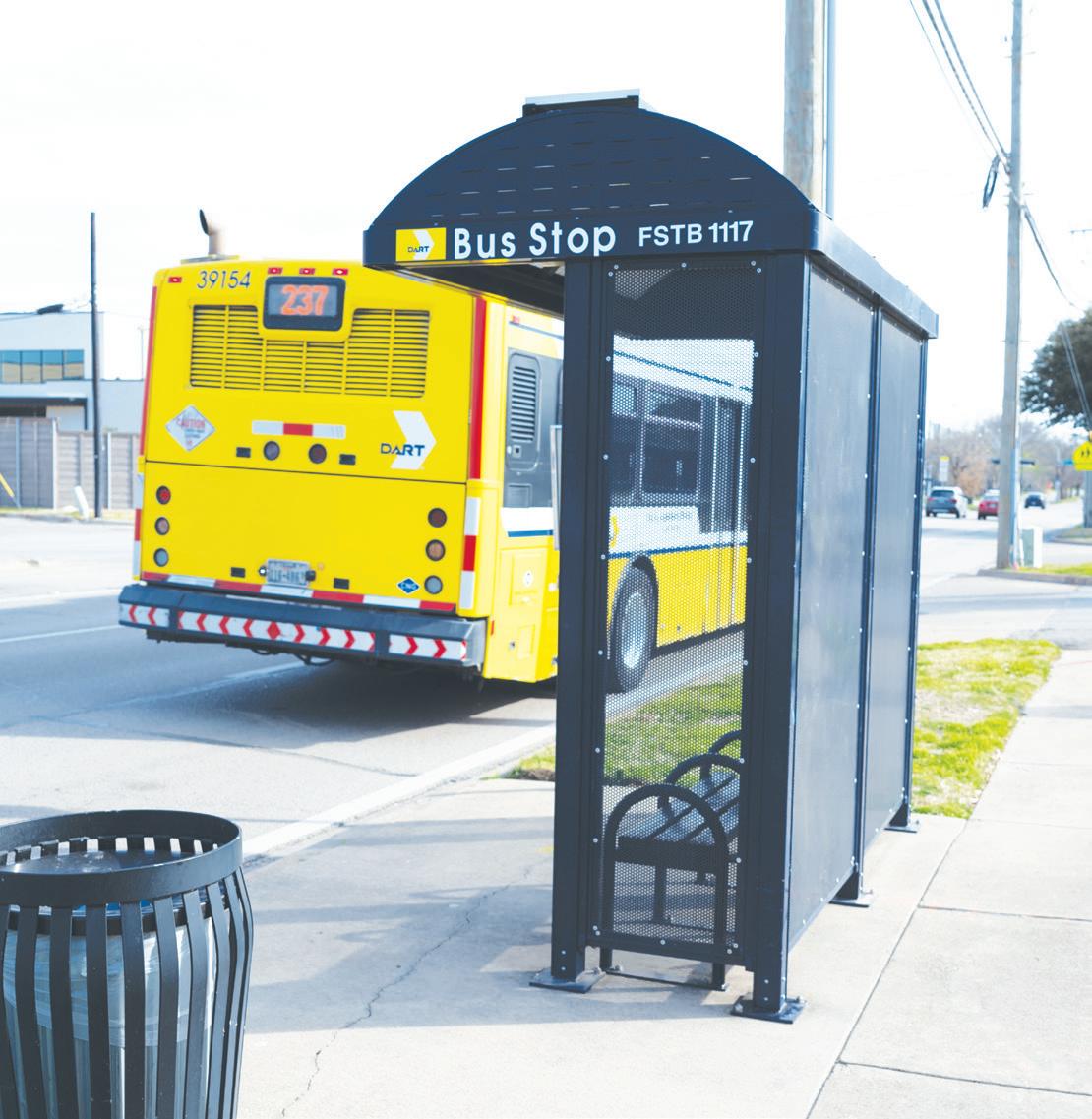

ly what he wanted respite from, and exactly what New York seems to combat.
“Having to walk 20 minutes or 30 minutes to the store, or even just my short 10-minute walk to work, promotes a more active lifestyle than driving your car,” Itani said. “And for the World Cup, where you’re talking about hundreds or thousands of Ubers that need to drop people off at the same location, (New York) can just send out more and more trains. Instead of coming every 10 minutes, trains will come every two or three minutes at those peak travel times so they’re able to move people around a lot faster.”

Itani believes not having to drive everywhere has a unique ability to make a city feel more accessible.
“Having to drive 30 minutes just to meet someone when I lived in Dallas quickly felt monotonous. But if you’re taking the subway and you’re walking, there’s something about it where it just feels like a shorter trip. It’s a little bit more engaging, and there’s more going on. For me, traveling in New York presents the chance to breathe; you can text, you can do whatever you want on the way there.”
But back home, one of DART’s original roadblocks — a public hesitancy to mesh with different people from around the metroplex — may be behind the wheel of a hesitancy to let go of car payments, save money on fuel and even cut down on environmental damage by taking public transportation, according to Kirk.
“Public transit has always had a little bit of a built-in classism to it,” Kirk said. “But I think a lot of it is generational. For example, my daughter who goes to college in New York rides the trains everywhere, so I think a lot of this opposition will dissolve as younger people go to school in cities that have transit.”
Ultimately, Kirk believes committing to expanding and improving public transportation in DFW is a necessity, regardless of whether everyone rides it or not.
“The reality is, to be a healthy, whole city, access to jobs and venues is critically important,” Kirk said. “And

public transportation is the way we equalize that for those families that don’t have the luxury of being able to buy a car. It doesn’t bother me if people that don’t need it don’t use it, as long as they support the investments so that those people who do need it have access to it.”
For more on this story, see smremarker.com
HOW TO RIDE
Four easy-to-follow steps to help aid anyone with an interest in using the DART public transportation system.

TICKET
At the station, approach DART’s Ticket Vending Machines on the platform.

ARRIVE
Various maps aboard each train and the operator’s announcements will help keep you aware of your location.
Three…
 Joseph Sun Academics Editor
Joseph Sun Academics Editor
Goodbye to 2023…
Two…
And hello to 2024…
One…
Happy New Year!
As the fireworks lit up the sky in Dallas, onlookers gazed with wonder. A couple minutes later, after all the photos were taken, champagne popped and cheers sung, everyone started to make their way home.
Before the countdown, on our way to Reunion Tower, my family and I decided to take the DART subway from our local stop, which was a short five-minute drive from home, to downtown in order to avoid traffic.
Besides the free holiday transportation ticket, we also thought an hour-long drive through New Years traffic could be shortened down to around half an hour with public transportation.
After boarding the Red Line transit, packed densely with other New Years-goers, the holiday quickly lost its luster.
STATION BOARD
Use DART’s online trip planner to help you find which of the 65 stations across the metroplex is closest to you. Find a seat wherever you like while being mindful of those reserved for the mobility-impaired.
“Oh, we will all get COVID,” a family joked about my family’s Chinese heritage.
“Why did you let them onto the bus?” they asked the man standing near the front of the sliding doors.
We were scared.
They continued. They jabbed at our race, that we were the cause of COVID, how we took up to much space and how we looked weird.


What had been a celebratory night had turned into a nightmare. For several stops, my family and I endured more viscious jabs and overt racism.
Three…
Just three more stops until our station.
I found myself unable to stand up to them. We just stood there, taking verbal abuse. All I could do was look at my feet.
Two…
They directed their attention at my mom. Calling her ugly. Insulting her face. Her skin.
One…
The doors of our carriage finally slid open at the Walnut Hill station, and we were relieved that it was finally over.
We should have just driven.
Jan. 1, 2024 was the first and last time I plan to take DART. On the carriage, my family felt vulnerable, uncomfortable and that there was nothing preventing violence.
Getting off and waiting for the next Red Line bus was also not an option –the next rail would take over an hour to arrive.
For my family, the DART resembles an uninviting, hostile place to be.
I ssues | R e M a R ke R Friday, March 8, 2024 | P age 5
COMMENTARY
transit:
Mass
my ugly personal experience
Dan Hunt ‘96
FC Dallas President
ARRIVAL The bus pulls away from the Preston Road bus stop, one of the various DART bus stops around DFW.
ON BOARD The inside of a DART light rail train provides space for up to 47 passengers on a single car.
THE SCHEDULE The arrival times of different routes are displayed at the LBJ/Central Station.
PHOTO / ZACHARY BASHOUR
PHOTO / ZACHARY BASHOUR
GRAPHICS / JOSHUA GOFORTH
PHOTO / ZACHARY BASHOUR

Activists push to increase voter turnout
Texas historically has low voter turnout, especially during the primaries. Executive Director of March to the Polls Camila Correa Bourdeau and others share what they’ve done within their communities to change that.
By Arjun Poi and Andrew Ye
The 2024 Texas primaries ballot included one U.S. Senator, 15 State Senators, seven State Board of Education members and several other state and county officials. The results of these elections directly impact citizens’ lives, sometimes even more than the results of the presidential election.
Yet, the state of Texas ranks No. 45 in the nation for voter turnout. In the 2022 Texas primaries, only 18 percent of registered voters cast their ballots.
“The primaries are more important than voting in the regular elections because if you don’t vote in the primaries, then the small percentage of people who vote in the primaries are the ones that decide who is elected,” state policy advocate Caren Edelstein said.
In Edelstein’s experience, due to the lack of votes, candidates can be elected by the smallest of margins.
“We have had some legislators that were voted into office by four votes,” Edelstein said.
Edelstein advocates for the National Council of Jewish Women in Washington D.C. and Austin, Texas. She believes that part of the reason Dallas has so few voters is because of the state’s limiting voting laws. Examples include, as Edelstein points out, the laws on voting by mail.
schools.
“We created a lot of educational content and videos to explain, ‘What the heck is a primary in relation to other elections?’” March to the Polls Executive Director Camila Correa Bourdeau said. “We’ve delivered that educational content directly in the classroom.”
Correa Bourdeau believes that Dallas’ low voting numbers aren’t from a lack of caring from voters. Rather, she has found through surveys that most younger voters believe their votes matter.
“They care very much about their communities, themselves, and their families,” Correa Bourdeau said. “We think it’s just a huge gap and lack of information.”
Joining the initiative more than five years ago in 2019 to combat the low voting numbers, the Chair-Elect of the Parents Association’s Voter Registration Drive Moyosola Ajaja organizes events to educate all grade levels on how to properly vote for people in power while also guiding seniors through the entire voting process.

“They’ve put a lot of restrictions on voting by mail in the last couple of years that have really affected people who are trying to vote,” Edelstein said.
These restrictions led to the rejection of 12.4 percent, or 24,000, mail-in votes in the March primary two years ago, according to the Texas Tribune
“When we restrict voting for people who may not know all the rules, then we’re not living up to what our constitution says,” Edelstein said. “Some people feel like if they restrict voting, then they’re going to get elected because more of their people are going to come out to vote. So I think it’s really important for young people who turn 18 to go vote and talk to their friends to go vote. ”
In fact, according to Who Votes For Mayor, a project done by Portland State University in 2016 that evaluated voting trends in major cities across the country, even though the median age of the adult population in Dallas was 40.8, the median age of voters in the 2015 Dallas mayoral election was 62.
To solve this issue, March to the Polls, a nonpartisan nonprofit organization, has been working to increase voter turnout among historically underrepresented communities, with a focus on youth and people of color.
Since 2015, the organization has registered more than 50,000 voters and works closely with more than 70 high
“For young adults aged 18 - 24 years old, these are the years they establish themselves independently of their parents or other adults who have authority over their lives,” Ajaja said. “Voting is a crucial way that they can influence the community outside their homes.”
During the fall semester, Ajaja runs the Voter Registration tables during lunch in the commons to register seniors for the November elections and twice during the Spring semester to hit the registration deadlines for the primary elections on March 5.
“We try to target the majority of the seniors and a handful of juniors who are eligible to vote, especially during the spring semester when we have a lot more students turn 18,” Ajaja said. “But our larger goal is to educate the entire school. We have a few guest speakers come in to talk to the boys about what to expect on election day and some statistics of voting in Texas.”
Because seniors are so busy during the spring, to reach more students, Ajaja is planning on organizing several more talks and question-and-answer seminars for the juniors next year during that time.
“There are a lot of powerful people paying money to keep students from voting,” Ajaja said, “but starting to educate the boys early on and help them through the tedious process is definitely one strong step forward in their path to manhood.”
Bourdeau considers voting an essential part of the democratic process.
“You’re a part of the community,” Bourdeau said. “Your voice is just as important as your neighbor’s voice. Everybody’s on an equal playing field. Every vote counts just as much as the others.”
Around Quad the
Four students eligible to vote share why they did or did not cast a ballot during the March Primaries.
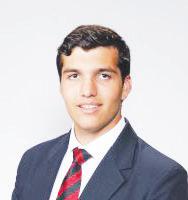
“I’ll vote because it’s my responsiblity. Everybody’s gotta do it. It’s the same as getting your license or getting drafted.”
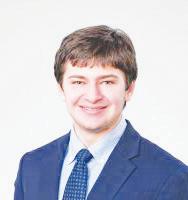
“I’m voting because it’s the first chance I get, and I have a civic duty and responsibility to vote and get my voice heard”

“I can’t vote because I didn’t know about the voter registration deadline on Feb. 5, and I missed it.”

“I’m 18, and I want to vote for the first time. It seems fun.”
STUDENT VOTERS Students walking in the Commons can see signs urging Marksmen to vote.
PHOTO / ARJUN POI
P age 6 | Friday, March 8, 2024 R e M a R ke R | I ssues
Camila Correa Bourdeau Executive Director of March to the Polls
Roman Childress Junior
Reed Sussman Senior
Asher Babilla Junior
Baxter Perry-Miller Senior

Dallas prepares for solar eclipse
After 146 years of anticipation, a total solar eclipse is finally passing through the Dallas/Fort Worth (DFW) metroplex. The school is planning activites urrounding the event for students, alumni and the entire community on April 8.
By Kevin Ho and Eric Yi
As the moon slowly creeps in front of the sun, forming a glowing orange halo that encloses a dark circle, the afternoon’s bright sky gradually fades to black. Shadows lengthen, and the world transforms into a nighttime imitation.
For the first time in more than a century, Dallas is preparing to view this celestial phenomenon that millions of viewers from across the country have eagerly anticipated.
These spectacles — solar eclipses — only happen two or three times annually around the globe. But the main factor for the anticipation stems from the rarity of experiencing a total eclipse.
“This eclipse is significant because there hasn’t been a total solar eclipse in Dallas for almost 150 years, and there won’t be another one in Dallas for several hundred years,” Science Department Chair Fletch Carron said. “You hear about eclipses all the time, but a lot of the viewing opportunities are for total lunar eclipses, which are more common because they can be observed from many locations on Earth at once.”
The shadow only lasts for a relatively short amount of time because it slowly moves away as the Earth and Moon spin. As a result, the majority of people will not witness a total solar eclipse in their lifetime. Fortunately, this once-in-a-lifetime experience will conveniently take place for the entire school community to see.
The eclipse’s start time is predicted to begin at around noon when the Moon begins its trajectory towards the face of the Sun. Thus, the environment will gradually change as it gets closer.
"Totality starts at 1:40 p.m., and it's almost four minutes long,” Carron said. “But the sun is starting to be blocked at around 12:30 p.m. So by 1:40 p.m., it’ll be completely blocked and it will get dark and a little bit colder. At 1:44, the sun will start peeking out and getting bright again.”
The Science Department also intends to coordinate engaging activities for everyone to participate in throughout the eclipse’s visible time frame.
“We will likely have some other little things out there, like telescopes with solar filters so that you can look at the sun during the lead-up to totality or in the aftermath, during the partial eclipse,” Carron said. “We may have some other things like pinhole viewers or pinhole cameras."
For preparation beforehand, students can expand their knowledge of solar eclipses by watching a planetarium show explaining its fundamentals. On the day of the eclipse, to ensure that all campus members will have the opportunity to see it, the department plans on putting together a modified schedule, though it has not been finalized yet.
“There will be an assembly reminding students how to safely view the eclipse,” Carron said. “From there, we’ll dismiss to the football field, and we’ll watch the eclipse. Every student will be given a pair of safe eclipse-viewing glasses that have to be worn all the way up until totality. Then during totality, you can take them off because it’s just like it’s night."
In addition to having specialized viewing accommodations for students and faculty members, the school plans on inviting alumni back to witness the eclipse.
But the roots behind the invitation trace back to the legacy of an alum: Stephen M. Seay ‘68, a renowned, longtime science teacher. Throughout his teaching career at the school, he often brought up
the predicted solar eclipse during classes and inspired his students to mark their calendars to be in Dallas during its appearance.
“He would tell his students, 'The big solar eclipse will be on April 8, 2024. I don’t care what you’re doing or where you are in life, get to Dallas and be on campus to watch the April 8 eclipse,’” Carron said. “Many of his students remembered that and are coming back to watch it."
TOTALITY SOLAR SEQUENCE




Partial Eclipse
The sun's disk is partially blocked by the moon.
Diamond Ring
The last of the sunlight streams through the moon's valleys.




Totality
The moon completely covers the entire disk of the sun.
Departure
The total eclipse ends as the moon begins to reveal the sun.
Youth psychologist speaks to Parents’ Association
By William Kozoman
Dr. Mary Ann Little visited the school on Feb. 21 and spoke to the Parents’ Association about childhood narcissism. Little, a psychologist with decades of experience dealing with youth development, was a teacher and mentor to the Director of Marksman Wellness, Dr. Gabby Reed.
Little felt that talking about childhood narcissism was needed, believing that society has changed in recent years, rewarding external traits and narcissistic tendencies, which she covered in her recent book.
“Right now, I see things moving in the wrong direction, especially with social media,” Little said. “That’s why I chose this topic.”
With the emergence of new advances in technology that many parents haven’t yet been able to adapt to, she finds it helpful to teach parents new approaches to raising their children. In her talk, she emphasized that many of the signs of apparent success - such as earning awards at school or in sportscan actually be hiding narcissism below the surface.
“So many of the signs of narcissism are hard to see,” Little said. “A lot of the signs parents think are good can actually be the opposite.”
As she has seen the issue develop further over the years, she finally decided to put her thoughts and advice into book format to better reach out to parents.
“I hadn’t published a book before, but I had experience talking to parent groups, so I decided this was a good time to start,” Little said.
Her visit to the Parents’ Association was a con-
tinuation of a long history of working with parents and helping them to better raise their children into good people. Moving forward, Little hopes that parents and children alike begin to learn better ways to root out narcissism early and change society in a better direction. She saw the school as especially pertinent to her message due to its nature as a competitive private school.
“There is an ultra-competitive environment at many schools,” Little said. “That makes it even more important.”
Student Store manager Nancy Goldberg, inspired by Little’s message, decided to put her book on sale for all to access.
The book will be on sale for the foreseeable future, allowing students and parents to learn more about childhood narcissism.
I ssues | R e M a R ke R Friday, March 8, 2024 | P age 7
PHOTO / COURTESY CREATIVE COMMONS
A TRUE SPECTACLE When the moon covers the light of the sun this April, the blue sky of the day will slowly fade into the darkness of the night, leaving viewers in the presence of a total solar eclipse, a sight many will not witness again in their lifetime.
pursuit of happiness
Finding satisfaction in one’s work is something people strive for. Yet it is not always easy to find, often requiring individuals to explore a multitude of jobs and career paths. But when they discover the profession they’re passionate about, they’ll know they made the right choice.
By Hilton Sampson, Arjun Poi and Rohan Kakkar
Fifth-grade humanities instructor Eric Slingerland always tried to stay on the beaten path.
After being exposed to Wall Street life as a freshman in college, he chose to join the close to 40 percent of Harvard graduates who seek consulting or finance jobs.
He did everything he was supposed to — worked day and night trying to secure a job in the competitive investment banking scene, interned over the summer at a private equity firm in Boston and earned a master’s degree at the University of Virginia.
But after four months of working his first investment banking job, he quit his job in search of something different. In search of a profession that gave him purpose and made him feel like he was making a difference.
He wasn’t sure what he was going to do next. He knew he wanted to travel and immerse himself in a different culture. And he knew he wanted to do something he was good at and, most importantly, enjoyed. He thought about the summer after his junior year, when he taught at a boarding school. He loved doing that.
So he googled, “Teaching Opportunities Abroad” and applied for a position online.
Two months later, he was teaching English at a Buxiban, a private tutoring center, for students in Taiwan.
Now, well off the beaten path, Slingerland had finally found the profession he loved – teaching.
“I don’t know how many Harvard graduates go to Taiwan and teach at a Buxiban,” Slingerland said. “Probably few. I decided to move to Taiwan only after I was confident that I didn’t want to continue working in finance, a path that I had worked so hard to follow.”
He had spent five years worth of time, effort and money trying to find a job in investment banking. And now, he never wanted to work in a bank again.
“I’m not judging the field of finance,” Slingerland said. “It does serve a critical role, but I didn’t feel the sense of purpose that I wanted to feel in my job.”
Slingerland believes that people have an ethical responsibility to give back to the society they’re a part of, and he couldn’t find a way for him to do that in the world of finance.
Now, as a teacher, Slingerland has found what he calls his purpose — his ability to make a positive difference in the world.
“I love working with kids,” Slingerland said. “I love teaching skills I’m passionate about and being able to share what I love to do and what things interest me. To be able to pass those along to kids and spark that same intellectual curiosity gives me a sense of purpose.”
CAREER PRIORITIES
Statistics
Across the U.S., only about half of all workers are satisfied with their current profession, according to PewResearch polls.

heading into college, inspired by a strong economy and booming stock market. But after starting out in college studying math and economics, Stegemoeller realized he wasn’t on the best path for himself.
“I wasn’t genuinely interested,” Stegemoeller said.
But after taking one philosophy class in college to fill a curriculum requirement, Stegemoeller knew what he wanted to do.
“The material struck home so much that I thought, ‘I want to keep thinking about these things,’” Stegemoeller said, “And one of the best ways to think about them is to teach them.”
Stegemoeller was confident in his decision to change his track of study in college to philosophy, but his parents warned him of the limited number of job opportunities after college.
While he was thankful for their advice and guidance, Stegemoeller was sure that teaching philosophy was the path he wanted to follow, beginning his career teaching philosophy in graduate school at Vanderbilt University.
Coming out of graduate school, his professors strongly encouraged him to pursue a career teaching in college, which did not coincide with Stegemoeller’s initial plans.
1 in 3
workers feel they have reached a dead end in their career
21%
20% of workers are eager to change jobs
While it can be hard for individuals to change career paths once they have entered the workforce, Malcolm K. and Minda Brachman Master Teaching Chair Dr. Martin Stegemoeller knows it is important to follow one’s passions when pursuing a career.
“You want to enjoy what you’re doing,” Stegemoeller said, “And the idea that you would work a 60-hour week and dislike most of that work. That’s just a missed opportunity.”
Stegemoeller initially thought he would pursue investment banking
“To me,” Stegemoeller said, “High school was the scene of the crime. My thought was that as soon as I started thinking about teaching, after grad school, I wanted to teach high school.”
But after receiving a job offer from the University of Alabama, Stegemoeller decided to heed their advice, accepting the position. Just three years later, however, his desire to teach high school remained, and to the dismay of his professors, he made the transition to St. Mark’s to teach 10th and 12th grade English.
“It was really stunning,” Stegemoeller said, “that there was such a bias against high school even among educators. That made me really sad.”
Now having taught here for 20 years, Stegemoeller is glad he made the switch.
He feels that his job teaching students coincides with his continued learning of the concepts and ideals he has been studying since college.
In
P age 8 | Friday, March 8, 2024 R e M a R ke R | I ssues
from Career Vision on American job satisfaction of
workers feel very passionate about their jobs
FINDING PASSION Eric Slingerland taught at a Buxiban school in Taiwan before coming to teach here.
PHOTO / COURTESY ERIC SLINGERLAND

IN THE CLASSROOM Martin
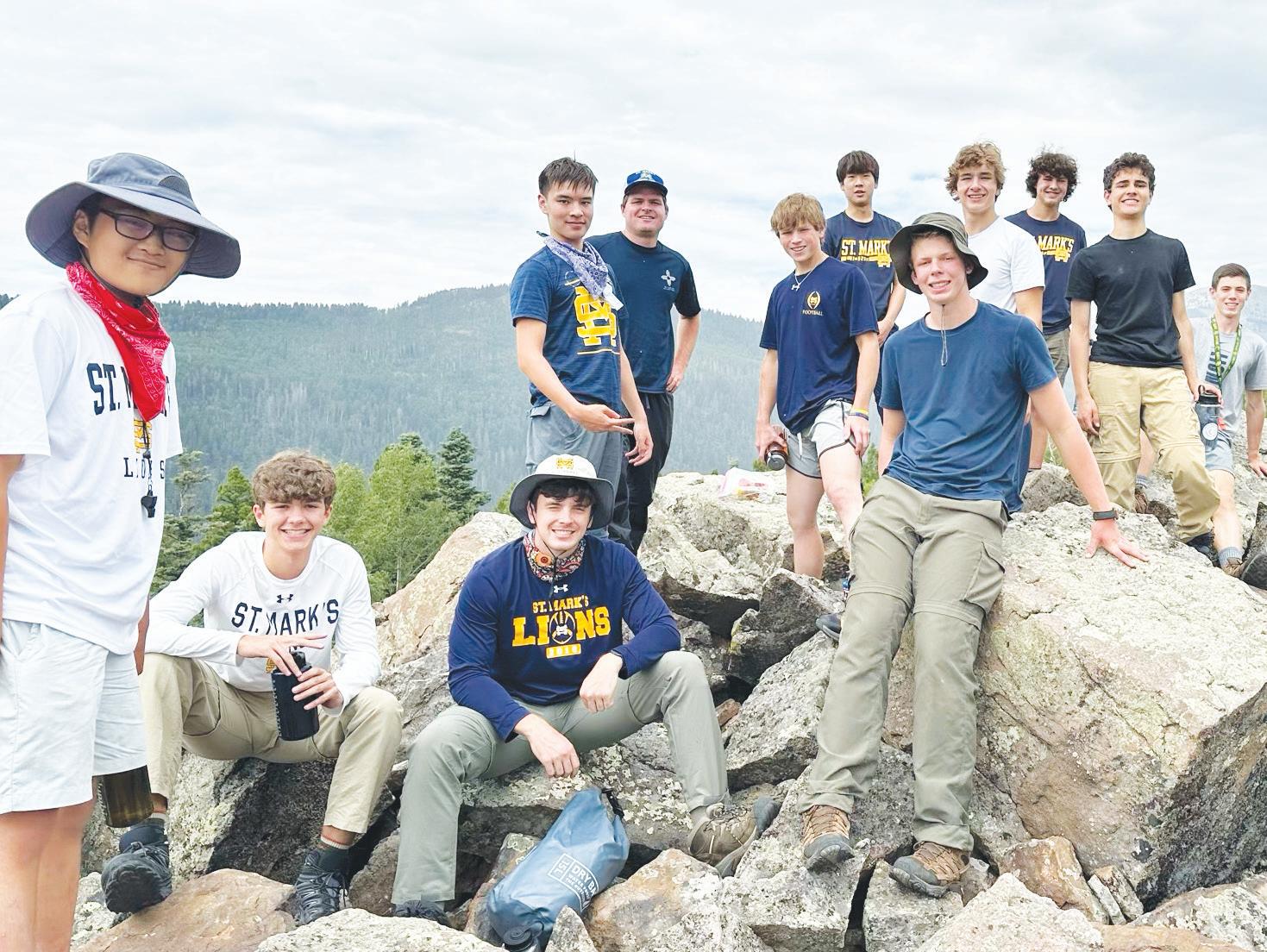
“I desperately needed to think through ethical things in my own life,” Stegemoeller said. “That’s what made it right for me. I think that has colored in a positive way my ability to convey to kids that this stuff actually matters. And it’s not just an academic subject. I have no interest in philosophy as an academic subject at all, I never have. I’ve always viewed it as utterly personal.”
“YOU WANT TO ENJOY WHAT YOU’RE DOING, AND THE IDEA THAT YOU WOULD WORK A 60-HOUR WEEK AND DISLIKE MOST OF THAT WORK. THAT’S JUST A MISSED OPPORTUNITY. ” - Dr. Martin Stegemoeller
Over the last several years, Stegemoeller has taught eighth grade humanities, which has given him the opportunity to teach American history while still incorporating philosophy into his teaching.
“American history is so interesting to me now,” Stegemoeller said. “It’s such a big part of what I care about. I think I’m a much better American as a result of teaching it.”
Continuing to teach and learn philosophy has been a rewarding experience that Stegemoeller has applied to all aspects of his life.
Robert Pou ‘21 has always wanted his career to align with his passions. He began learning about his passion, investing, during middle school and joined the Investment Club during his time at St. Mark’s.
He initially attended Georgetown University, mostly due to its prestige, but ended up transferring to Texas A&M because it was a much better fit for him. In the future, he hopes to not make the same mistake as he did when applying for college while applying to jobs.
“When it comes to the next chapter of my life post undergrad, I’m not going to let my salary or the prestige of the firm dictate whether I accept a particular job,” Pou said. “It matters to an extent, but it’s definitely not the biggest factor.”
In the end, however, Pou believes that one’s major will not directly
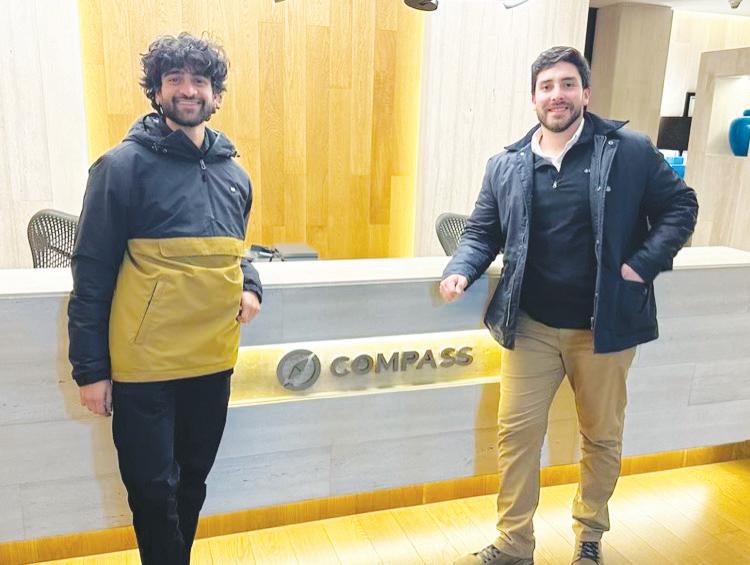
impact their future salary and that one can find a sustainable career in whatever field of interest they pursue as long as they work hard and give 100 percent effort.
“I think one of the most important things about college is not necessarily the knowledge you gain in a particular class, but rather the fact that you can tell an employer you graduated from a university,” Pou said. “It means you showed up to these classes consistently, maintained a schedule and earned your degree. It tells an employer you’re employable, so to a certain extent it doesn’t matter what major you’re in, because if you work hard, the sky’s the limit.”
On the other hand, alumnus Josh Mysore ’21 has always known to pursue his passions in college while maintaining an openness to other career fields.
As a current Harvard student who majors in both social sciences and computer science, Mysore is currently undecided on his future career plans.
Mysore believes that following one’s passion for a job may come with some challenges, but posits it is worth it to continue to work in an environment that one enjoys. Discovering these passions occur at various points in life, and for Mysore, it happened during the first semester of his time at Harvard.
“I was very into language learning, and when I learned that computers can understand human language, that was my first interest in computer science,” Mysore said. “I took linear algebra and introduction to computer sciences my freshman fall, and they were phenomenal courses. I think that really jump-started my interest in computer science.”
Finally, when considering his future job, Mysore believes the kind of lifestyle one wants to live plays a big role in considering their job.
“I think the most important thing to consider is talking about passion versus financial capital, and that balance is, without a doubt, what you want out of a lifestyle, because it comes down to asking yourself if you’re comfortable earning less than your peers and living with less money,” Mysore said. “Do you want to just have a stable, secure job and have a good income, but maybe not be as passionate about it?”
MAKING THEIR MARK Eric Slingerland led a
PHOTO / COURTESY JOSH MYSORE
I ssues | R e M a R ke R Friday, March 8, 2024 | P age 9
group of juniors on the Pecos Wilderness trip this past August as a member of the school’s faculty (left). Josh Mysore ‘21 moved to Chile to work for Compass following his graduation from college (right).
Stegemoeller encourages a student while working on an assignment.
PHOTO / SEBASTIAN GONZALEZ
PHOTO / COURTESY DAVE CARDEN
AI’s genesis
Just this February, Open AI's Sora, an artificial intelligence that can generate high quality videos, has shaken the world with beautiful but synthesized cinematography. Will AI take the era of painters, videographers and artists over?
By Kevin Ho, Doan Nyugen and Joseph Sun
Draw me Will Smith eating spaghetti in an oil painting in Van Gogh’s style, with high-quality 4K resolution.
What would normally take an accomplished artist days to paint is shortened to mere seconds. Thousands of brush strokes replaced with one click on the keyboard, then the enter key. In an instant, a 4K resolution image of Will Smith eating spaghetti renders on the computer screen.
This begs the question: can anyone be an artist?
As large corporations such as Google and Microsoft funnel billions of dollars into the fastest-developing field of Artificial Intelligence, this technology will only become more advanced, more sophisticated — more human
Art instructor Kate Wood has heard the rumors and speculations — that painting is dead
She doesn’t know what’s going to happen in the future. In 20 years, would her job as both an artist and a teacher still be available? AI has shaken the art world, with millions of artists’ careers on the line.

But looking back into history, similar events have happened before. In the early 19th century, a new form of art was quickly rising in popularity: photography.
“When photography was in-
render images to get something out of his head into something physical.”
In many ways, artists can utilize AI in their projects, pushing the boundaries of creativity.
“This comic book has images created by AI, but texts created by humans so it’s eligible for copyright protection,” Wood said. “I think that’s a positive example that’s empowering; somebody could potentially self-publish a graphic novel and not need a degree.”
Wood believes that the advent of AI supplements mankind’s inherent desire to express themselves through art. Now, most people have the ability to express themselves artistically without having to take professional classes.
“Being a mother and teacher of young children, I was seeing, firsthand, this early development and this insatiable desire to draw and scribble and paint and mold with your hands,” Wood said. “There is this creative force that every single person can all tap into — everyone can be an artist.”
Although Wood is uncertain about her future in the art field, she’s not opposed to change. Rather, she’s optimistic and almost excited about this new step of the evolution of art.
“AI is the newest innovative technology that we have to respond to,” Wood said. “I think we’re gonna see artists push themselves and use this technology in a way to further their art and creativity.”
To better understand the true capacities of AI programs in the realm of academics,
saying a single word. I also showed my students this because I want them to know that there’s a lot of fake news out there. You have to make your own judgment.”
As more companies such as ChatGPT and Midjourney continue training various AI models, AI may soon be ingrained into our daily lives.
“The AI era is coming,” Lin said. “We can’t stop it. We can’t say that we’re not going to use it because people are going to use it anyway. So, what we need to do is train students. It’s ethical if you do something on your own that isn’t copied from AI, and you can use AI as a way to give some ideas on how to do it. For example, you can use AI to practice your Chinese.”
No matter how AI develops, Lin believes there will always be a clear distinction between humans and AI — one thinks and the other imitates thinking.
“You have to know that you are smarter than AI,” Lin said. “You can use AI, but how you use it and how ethical it is is an issue, and we need to train students on that.”
Beyond the classroom, AI’s influence has also permeated into the music industry. Organist and Choirmaster Glenn Stroh sees AI as a tool that musicians can use to aid them in artistic processes, such as music inspiration and composition.
However, there are still some concerns that people need to be wary about. Along with the gray area that questions original compositions, there are definite lines that should not be crossed.
“I WAS SEEING THIS INSATIABLE DESIRE TO DRAW AND SCRIBBLE AND PAINT AND MOLD. THERE IS THIS CREATIVE FORCE THAT EVERY SINGLE PERSON CAN ALL TAP INTO — ANYONE CAN BE AN ARTIST.”
- Kate Wood
“A lot of what I’ve heard people say is that if you’re not

Page 10 R e M a R ke R Friday, March 8, 2024
THE LAST SUPPER The Last Supper is a mural painting by Leonardo DaVinci, completed circa 1495. However, this image is modified using Photoshop 2024's new feature: Generative AI. By modifying small parts of the Last Supper, a partially modern rendition of DaVinci's famous painting can be generated. Small things, such as Jesus holding a coffee cup, can be noticed throughout the new version.
Kate Wood Art Instructor
Decoding creativity: brushes or an algorithm?


To compare the similarities and differences with the current state of artificial intelligence (AI) and humans in art, here are two artworks: one created by a human and the other by Artbreeder.com, an AI art generator. Both were prompted with the same request: 'a painting of an eye'. The results were strikingly distinct — the AI produced a hyper-realistic depiction, while the human artist's rendition leaned towards a more animated style.
within the music industry because AI might create situations where certain employers or certain works are obsolete,” Stroh said. “This can be people writing a jingle or making background music when you’re shopping or waiting on hold. That can now be created by AI.”
And yet AI’s capabilities are steadily growing to be more advanced.
“We know that Beethoven wanted to write another symphony, and fragments of this composition existed,” Stroh said. “In the 1980s, a musicologist reconstructed it based on (Beethoven’s) compositional language. Now, AI has done the same. I think it’s fascinating to have this tool available, and we’re obviously on the edge of a new frontier.”
Similar to the substantial attention AI has garnered in music and art, its abilities have also affected the film industry — people have raised questions about the ethics of AI usage in cinema.
“The most practical stuff is related to audio work,” film studies instructor Mark Scheibmeir said. “They can take somebody’s voice and essentially recreate it. If a sound occurs somewhere in the middle of a person's dialogue, they have software now that’s capable of replacing it.”
Besides being able to produce audio composition from an actor’s voice sample, deepfakes are also explored in production.
“They’re not widely used yet. But again, all
these things are in their infancy right now,” Scheibmeir said. “We can scan actors and recreate their image pretty easily. A while back, somebody licensed the rights to recreate James Dean, a classic movie star from back in the day.”
Dean, only starring in three movies before he died in 1955, was brought back to lead in the film “Back to Eden.” Although Dean’s career had been cut short, leaving fans wishing for more from him, his recent return through AI wasn’t received well.
“Everybody was like, ‘Oh, my gosh, we can’t do that. That's so creepy,’” Scheibmeir said. “There's questions of whether or not they can recreate this after the person's gone. Who owns that? There is the human component of ‘Do I want to watch things that are created?’ It's lab-grown in a way.”
Dean, along with the recreation of the late actor Peter Cushing in “Star Wars”, has created controversies about resurrecting dead actors, changing their legacy, and diminishing opportunities for living actors.
“I think the idea that we can own somebody’s likeness is a little off-putting,” Scheibmeir said. “There are religions in the world where capturing somebody's likeness is actually against their religion, and when people took their first photographs, it was similar. “I think everybody needs to be on board. There can't be anybody who says no.”
There are several parallels between AI and other advancements in the film industry. Initially,
color and sound were received with skepticism in the early 1900s, and a similar reception happened with computer-generated imagery (CGI) in the late 1980s.
However, as those technologies became advanced, efficient and accessible, they eventually became a crucial part of many modern movies’ successes.
“We’re figuring out from a commerce standpoint, ‘what does the audience even want?’,” Scheibmeir said. “I imagine the conversation related to it will continue to evolve. If I put something in (AI) and it generated an image that you thought was cool, how much would you be willing to pay for it knowing that I spent five seconds?”
Like with CGI, Hollywood is grappling with whether audiences genuinely desire artificial elements in their entertainment.
“You take Tom Cruise’s nose and his eyes, and you give them Ryan Gosling’s mouth and you essentially create this sort of AI-generated human that has all these famous features,” Scheibmeir said “It’s nobody, right? It’s not a real person here. It’s not Tom Cruise. It’s not Ryan Gosling. As the audience, if we want to experience something artistic, do we feel like it needs to be human in order to get what we get from art?”

S ection | R e M a R ke R Friday, March 8, 2024 | P age 11
ALGORITH This is an AI generated eye, created within a couple seconds after being entered a prompt. ARTIST created by staff member Joshua Goforth on Procreate, this eye took around two hours for him to draw.
Textbook tug-of-war
With the number of rejected textbooks growing each day due to politicized issues, it’s imperative that the school is able to navigate these controversial education choices and decide what is best for students to learn.
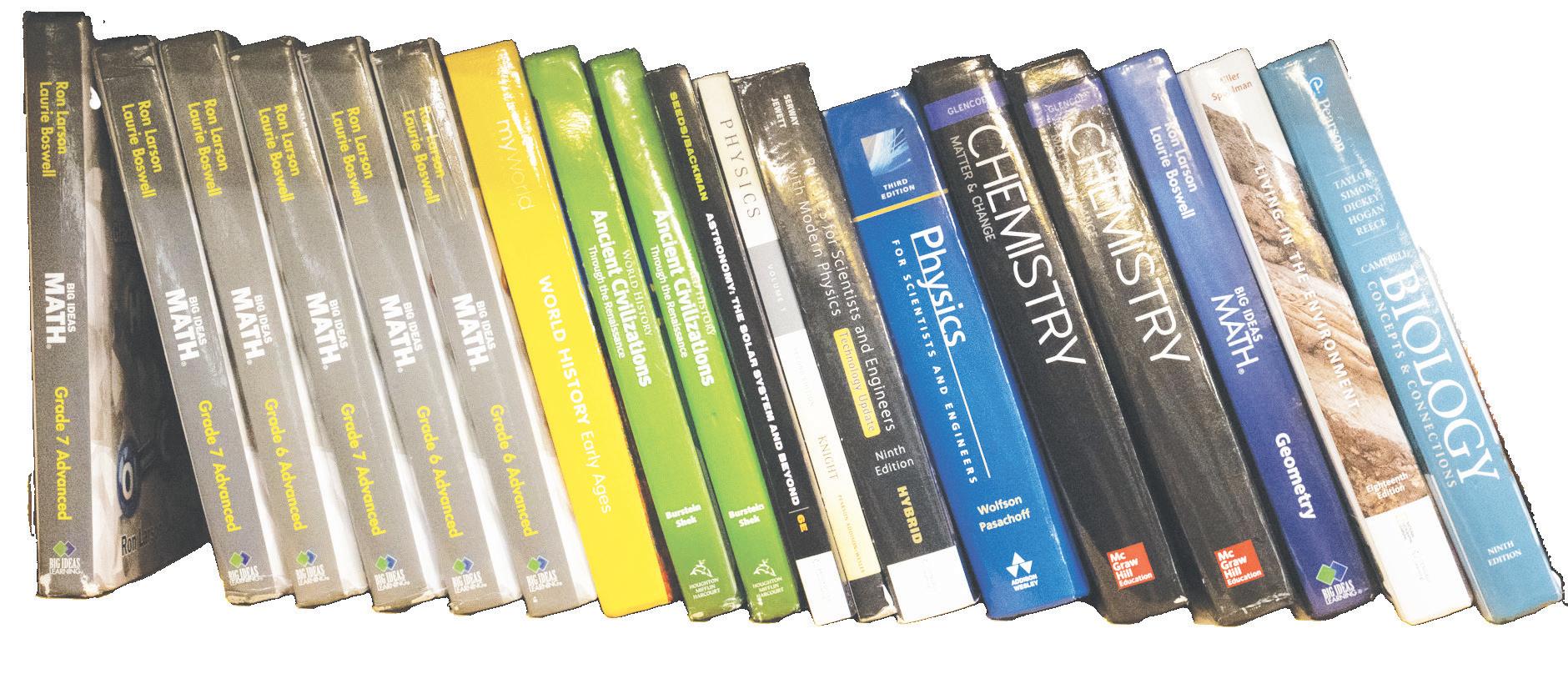 By Rohan Kakkar and Ronit Kongara
By Rohan Kakkar and Ronit Kongara
Out of 12 proposed science textbooks this past year, seven were rejected by the Texas Board of Education. Many of these proposed textbooks contained controversial topics such as climate change, sparking debate over what is appropriate in a textbook. The Texas Board of Education is responsible for public school curriculum standards and reviewing instructional material.
Across the United States, schools grapple with the issue of finding age-appropriate and informative textbooks for their students. Teachers go through the process of debating their textbook choices with curriculum designers, school administrators and parents’ associations. This issue has become increasingly prevalent, with school administrators and parents clashing over the appropriateness of specific textbooks.
Here, teachers work with department chairs to select textbooks, and orders are placed through an online service.
As the head of the science department, Stephen M. Seay ’68 Science Department Chair Fletcher Carron leads the crucial process of selecting books for the several science curricula.
“We leave it to the teacher to propose, and then department chairs review the selected books,” Carron said. “In our department, the expertise lives with the people who teach the various subjects, not with the department chair, so I might just look at the textbook to review appropriateness for the level.”
Because public schools are funded and therefore regulated by the government, school material is of-
ten highly monitored and filtered, resulting in textbooks with sensitive topics being banned.
“We, as an independent school, have the freedom and support to present material as we see fit,” Carron said. “We do not feel pressure to fall in line with something that’s happening on a statewide level politically. In fact, we take pride in being able to teach science the way it should be taught.”
In addition to textbook selections, teachers have certain freedoms over choosing other ways the material is presented to students. These freedoms allow students to experience various viewpoints during their time at the school, creating a broader knowledge base for all Marksmen.
“A big part of the school’s success is having the luxury to hire excellent teachers and then protect the freedom of the teachers to make all sorts of decisions about how to present material, not just textbook selection,” Carron said. “But, yes, you could consider book selection as one of the ways our teachers apply their expertise to develop an excellent course, free from guardrails that might keep them in a narrow lane of instruction.”
The next major step in the textbook selection process is ordering and delivering these books through MBS. Every May, Student Store manager Nancy Goldberg sends an email to all department chairs and works through a process to eventually have appropriate and in-stock textbooks ready for order, while Director of Academic Information Systems Paul Mlakar works to create schedules for students and collect students' names and addresses for the textbooks to then be mailed out.
“I send (the department chairs) the books they ordered last year, and they take that list and then
update it by crossing out books they don’t want anymore and adding books every class (requests) specifically,” Goldberg said. “I take all those lists and I update an online portal that I have from our textbook vendor, which lets me know which books are available and which books aren’t. Then, I go back to the department head and say these don’t work, and they have to pick more.”
Throughout the years, the most consistent problem has been finding an alternative textbook when one is out of stock or not published anymore. Also, all textbooks for students are newly purchased to ensure they are in good condition and without previous markings or annotations.
As computers and other forms of technology have become more prevalent in today’s curriculum, more and more textbooks offer digital counterparts to supplement the physical textbook. This is another layer to consider when placing textbook orders, but digital textbooks have some significant advantages.
“Most (digital textbooks) are used in addition to a hardback textbook, so you can access the book at any time in case you left your book at home or you’d like a book at school,” Goldberg said. “In the case where we have digital, there’s also a hardback to go with it.”
While there may be some issues with specific textbooks arriving at students’ houses before the start of school, over 96 percent of textbooks arrive on time, so the vast majority of students have all their textbooks before the beginning of the year. For the select few textbooks that do not arrive on time because of backorder or delays, temporary online versions and other accommodations are made to ensure that students have the required materials for
Mead journeys into world of writing publishing paleoanthropology
By Doan Nguyen
Eugene
McDermott
Master Teaching Chair in Science John Mead is celebrating the 10-year-anniversary of the discovery of Homo Naledi by stepping outside his line of expertise — writing a book.
For over 10 years, Mead has been corresponding and working with Dr. Lee Berger, a paleoanthropologist who co-wrote the book, “A Skull in the Rock.” Mead’s interest in the subject only grew as he heard more and more about Berger’s talks and new discoveries.
“I worked with Dr. Berger and his team and have probably talked about this topic and human origin stuff more than any other middle school teacher out there,” Mead said. “I finally got kind of annoyed that no one had written a book for middle school students.”
Around three years ago, Mead realized he wanted to write a book on Naledi, but he was inexperienced. He had no idea where to start.
Mead reached out to Berger’s co-writer on “The Skull in the Rock,” Marc Aronson, a professor at Rutgers University in children’s literature, instantly connecting over their new discovery. With more than two dozen books under his belt, the experience he has in the publishing world is a perfect fit for Mead’s scientific knowledge.
“He’s a great partner who knows how the systems work,” Mead said. “He’s guiding me through the writing and the publishing aspect of it."
Together, the scientist-writer duo have tentatively planned a 160-page compilation of stories all about discoveries and current news having to do with human origins research. They’ve seen interest from
Macmillan Publishers, one of the Big Five publishing houses. But between the hundreds of hours of interviewing, writing and editing, Mead knows that publishing a book takes a lot of effort.
“Initially, the idea of writing a book seemed difficult,” Mead said. “I had no idea how you go about doing that other than the obvious sitting down and typing it out.”
Now introduced to the world of writing and publishing, Mead has been finding more opportunities or topics where he thinks writing a book on it would be a fun passion project.
“I have two other book ideas in my mind and one I’d call a passion project,” Mead said. “It’s one that I don’t know that anyone else would be interested in. But now that I have a sense of how it works, it’s worth giving it a shot.”
P age 12 | Friday, March 8, 2024 R e M a R ke R | a cade M ics
PHOTO / COURTESY TEDDY FLEISS
A WIDE SELECTION The school features several different science textbooks for students to freely choose from.
COVID-19: four years later
It's clear that the pandemic left its legacy through increased learning issues and loss of countless lives. However, the social reprecussions are often overlooked – isolation has brought a surge of anxiety and other disorders.
By Oliver Peck, Joseph Sun and Christian Warner
Two days before spring break, the atmosphere at school was unsurprisingly chaotic. A naive cheerfulness filled the air as students joked with each other and talked about their plans.
News of DISD and other private schools canceling due to COVID-19 had spread across campus like wildfire. Then, 8th grader Alex Soliz had been one among many hoping school would cancel here as well.
He was also among those who thought it would all end in a week, at most a month — just a short extension of spring break, leaving more time to hang with friends and relax.
But it was far from that.
For the parents, a nine-to-five was replaced with work at home. For students, math problems on white boards were replaced with daily Zoom sessions. For kindergarteners, days spent swinging from the playground’s monkey bars were replaced with tablets connected to calls.
Parents had to worry about their children’s every meal and accommodate their time at home. Students were starved of class time and academic development. The youngest kids were losing crucial time to develop social skills.
Soliz was one among many who wished they had those years back.
“All I did was play video games,” Soliz said. “I wasn’t really allowed to go see my friends except for one of my friends who lived really close to me. It really did suck.”
In addition to the apparent social connectivity issues, Soliz believed the pandemic softened the school experience for students.
“On Zoom, you just have to wear your school shirt,” Soliz said. “Nobody’s paying attention to if you’re wearing pants or not. Now, I get to school at eight o’clock every morning, even if I have first period free. Online, I remember I was waking up at like 8:20 to go to my 8:30 class. I found myself getting really lazy and not caring as much because it didn’t feel real.”
While older kids like Soliz didn’t get to see their friends, and college-ready seniors didn’t get to enjoy their last monumental year of high school, younger kids suffered the worst consequences due to the lack of social interaction at such a young and developmentary age.

studies isn’t the main focus but developing social skills is, quarantining significantly hindered social proficiencies.

“There might have been a wild situation in the kindergarten phase,” Upper School Counselor Dr. Mary Bonsu said. “(The younger kids) may have missed out on the areas of their brain that develop from just being able to read social cues visual cues, and practice things like sharing and being in spaces with other kids their age.”
Akin to these children, maturing teens also faced similar challenges socially through the pandemic.
pact.
“I definitely think COVID-19 allowed us to connect in new ways,” Bonsu said. “It has had a positive outcome on adults, since it's allowed more flexibility for adults to be able to work from home and spend a little bit more time with their children.”
“I think it affects the younger kids the most, because being with other students in preschool or when you're really young is a huge social point in your life.” Soliz said.
This absence of human interaction left an irreversible impact on some kids, as crucial social growth occurs in the brain during this time.
“I was talking to one of my friends who has a first grader buddy, and he said his kindergarten year and the year before that were online, so he’s really shy now and doesn't really interact with his friends that much,” Soliz said. “So I think it's the worst for them.”
For young kids, where difficult and rigorous
“For kids around age 13, their brains start to rewire itself and advance in their need for social rewards from peers,” Bonsu said. “Social relationships become very important. The brain becomes activated by warmth and pure acceptance.”
As young kids faced an increase in developmental delays, learning disabilities and more, other psychological repercussions, such as anxiety and depression have increased since the pandemic.
“There have been terms like collective trauma that have been thrown around,” Bonsu said. “Many of us will have an emotional reaction to just even seeing the mask, right?”
Although social-distancing forced students to cut physical contact, Bonsu highlights certain ways in which it alternatively had a positive im-
According to a study by the National Center for Biotechnological Information, children who spend significant time with their parental figures and friends have a mental well-being that is healthier than kids who do not. The negative effects following the latter reflect on the lack of connection during the pandemic. To combat this, kids turned to new ways of socializing.
“Technology tried to account for that lost social time, and it changed the way in which kids interacted,” Bonsu said. “Connections were made through online means. There was more online gaming, there was more texting and more socializing through social media.”
In the polarizing wake of the COVID-19 pandemic, fundamental changes within the development of kids seemingly alienate this extraordinary generation in ways previously unseen and unpredictable. The rapid innovation of technology and sociology reshaped society, sparking world-wide debates among experts.
“The pandemic unfortunately resulted in a lot of loss,” Bonsu said. “However, I think it just made us value life a little bit more, and I think that goes across all ages.”
Seventh grader expresses musical passion through newfound organ interest
By Kayden Zhong
When seventh grader Thomas Costa first came in first grade, his senior buddy, Jake HorigomePigg ’18, an All-State Chorister, walked him into the chapel, showed him up the stairs, and introduced Costa to the Roosevelt Family Pipe Organ. Since then, Costa has spent hours in the chapel loft playing the organ under the guidance of organist and choirmaster Glenn Stroh.
Though he was first exposed to the organ in first grade, Costa first began to fully appreciate the instrument in fifth grade, after he had joined the choir.
“When I first came to St. Mark's, Jake invited me to Evensong,” Costa said. “At Evensong there were two things that really stood out to my firstgrade self, which were the organ and the choir. I had sort of an idea that choir was something that
I wanted to do in middle and upper school, but I wasn’t sure about the organ. And then, later, when I joined the choir I sort of brought the two together and was like, ‘Whoa, there's a whole world in these two things that's so interconnected.’”
Costa had taken piano lessons for several years up until that point, and in sixth grade, he began to receive instruction from Stroh in the form of finger practices and small pieces. Recently, he’s begun playing longer and more complex pieces, with a greater focus on articulation and phrasing.
“Having knowledge of a keyboard is good to have when playing the organ,” Costa said. “I probably wouldn't ever have begun playing the organ if it weren't for having played the piano. But the organ couldn’t be more different from the piano. When you sit at an organ bench, you need to have a different mindset from when you sit at a piano bench.”
Costa meets with Stroh once or twice a month, depending on the choir’s schedule. Outside of his personal lessons, however, Costa has also started the Organ Club, which aims to both educate middle school students about the Roosevelt Family Pipe Organ and give them the opportunity to play the instrument themselves.
“We have participants from fifth, sixth, and seventh grade,” Costa said. “It really started as a way for other people who are curious about the organ to come together and to learn more about it and to even play it.”
Stroh supports giving students the opportunity to interact more with the organ.
“It’s not your everyday instrument,” Stroh said. “Thomas has phenomenal talent and dedication to the instrument and it is a pleasure to not only be able to teach him and guide his path but also help him educate others.”
A c A demics | R e m AR ke R Friday, March 8, 2024 | P A ge 13
PHOTO / JOSEPH SUN
Alex Soliz Student Body President
ALONE During the pandemic, many teens resorted to online gaming to cope with social isolation.
The art of engaging students
As timeless teaching methods, such as lectures, are compared against discussions around the Harkness table, teachers are forced to weigh the pros and cons of each to provide the optimal learning experience for students.
By Oliver Peck and Josh Goforth
During their time in high school, students are often more preoccupied with what grades they receive than what knowledge they can take with them from each class. Cramming for hours may sometimes seem like the most efficient study method because, in the moment, a good transcript appears much more valuable than any real understanding of their subject.
As a result, engaging methods of instruction are crucial for teachers to prevent students from falling behind. While each teacher has their own approach, the essence of teaching remains the same.
For Nancy and Jeffrey Marcus Master Teaching Chair Bruce Westrate, lectures embody the essence of teaching — students learn a lot more material, creating a body of knowledge that can be used to draw analogies or perform analysis on the spot if need be.
“In lectures, it’s content driven,” Westrate said. “Discussions are well and good, and I have them in my class all the time, but in terms of acquiring historical knowledge, you really have to acquire it.”
On the other hand, history instructor Jerusha Westbury believes lectures lead to poorly internalized knowledge because students aren’t as actively engaged.
“There have been some studies that have focused on student learning,” Westbury said. “And it’s really interesting that students tend to perceive they learn more from lectures, but when they're tested afterwards, they’ve actually retained a lot less than they think. It’s just going into a temporary bank versus being stored long-term.”
Instead, Westbury believes that students must analyze history through a broader lens to acquire a deeper understanding of the material.
“I’d prefer my students think of history in terms of big picture changes or as a narrative framework,” Westbury said. “When they get to college, and they’re taking classes that are more focused on specifics, they’ll hopefully be able to remember the big idea of what’s happening in the world so they can go more in depth.”
However, Westrate believes that without the hard facts learned from a lecture, good discussion is not possible.
“If you just had the story and nothing else, it would be like just having a skeleton there,” Westrate said. “If you just try to analyze some facts for which you have no story, you just have a pile of mush on the floor. So, we try to put them together to give students more complete results to draw from later on.”
Both teachers agree their style of teaching aims to prepare their students for work beyond the classroom, but the additional skills each style provides students with are vastly different. Although both styles contain some degree of both note-taking and conversations, the lecture method stresses the importance of pen and paper.
“Lectures require students to master the skillsets

for note-taking that they’re going to need as you go forward,” Westrate said. “Many students are only introduced to this requirement for the first time when they come into my class.”
In contrast, the discussion method stresses the importance of one’s voice.
“The main benefits are for student retention, but there’s also a social component to it,” Westbury said. “You can tell when people are zoning out; part of it is learning the social skill of how to look interested, even when you’re not.”
“I WANT MY STUDENTS TO THINK ABOUT MY CLASS AS A PLACE WHERE YOU CRAFT UNDERSTANDING TOGETHER RATHER THAN AS A PLACE TO SHOW HOW SMART YOU ARE.” Jerusha Westbury
Along with developing these beneficial skills through their teaching styles, both teachers want to develop students’ abilities to think, as they believe teaching is more than just imparting academic knowledge.
“I want my students to think about my class as a place where you craft understanding together rather than as a place to show how smart you are,” Westbury said.
In a student-focused classroom, the responsibility
lies on the student to form views about the world, using their body of knowledge to guide them.
“I try to make my class interesting and fun for my students,” Westrate said. “It isn’t just a dry lecture all the time—we stop and we talk and joke around. But of course, in the end, that’s not my goal. My goal is to turn them into slightly more serious people in terms of the way they’re able to look at the world, because there is no better way to fix ignorance than through history and knowledge.”
Sophomore Ailesh Sadruddin has had hands-on experience with both methods of teaching throughout his two years in high school, and has personally found he retains knowledge better through discussion-based learning.
“During discussions, you’re more engaged in the class,” Sadruddin said. “And if you have more of an idea of what’s going on, you’re able to keep talking with the teacher and your other classmates, and that lets you get a better sense of what you’re learning.”
But instead of wondering what teaching style fits the students, it might be worth asking about what fits the teachers.
“You have teachers who are fun to listen to,” Westbury said. “I love listening to Dr. Westrate talk about history—it’s like a fun story. And I don't want to talk that much, I would find it exhausting. I feel like my students would get tired of hearing it because I don't have that sort of natural storytelling ability.”
Senior Reed Sussman takes a chance with his first year of photography
By Andrew Ye
Introduced to the art through fulfilling a simple fine arts requirement in middle school, Senior Reed Sussman’s love for photography blossomed following his seventh-grade year and quickly transformed into a lifelong passion. Photography, an art built on originality, constantly pushes Sussman’s creativity and forces him to think outside of the box.
“Photography is very unique and always fascinated me, which was why I selected it to be my elective,” Sussman said. “It was an outlet for my repetitive life and a way to be creative instead of just doing math and physics.”
Sussman took a break from the course after middle school to focus on his studies and building up an academic profile. However, in his senior year, Sussman found himself with one more spot to fill in his sched-
ule, and the choice was obvious.
Now, fully immersed in the world of photography again, Sussman finds inspiration everywhere he goes.
“When I’m walking around now, I’m always thinking about whether or not I can make something into a photo,” Sussman said. “Photography has constantly been on my mind since, and I find myself deeply appreciating the environment and architecture around me even more now.”
Sussman dedicates a lot of time and thought to each of his pictures, creating his own complex style of real-world imagery mixed with surreal visuals.
“I love shooting surrealism; it reflects a lot of the qualities of photos taken by photographers I admire that I try to emulate now,” Sussman said. “I’ve had a lot of my friends come up and talk to me about why my works are so creepy, and I find that pretty funny.”
Sussman, despite his heavy workload and the col-
lege application stress senior year brings, has still managed to work photography into his schedule.
“At the end of the day, it just comes down to time management,” Sussman said. “I find myself fully utilizing my free periods to finish up my school work while dedicating a lot of time after school to lifting and soccer, all while saving time over the weekend to shoot photos and edit them throughout the week.”
For Sussman, photography is a gratifying hobby and beneficial skill that enhances his thinking and overall mental health.
“I was choosing between taking AP Chemistry this and photography this year, but I chose photography because I think it's really powerful and a skill I wanted to go into college with,” Sussman said. “It’s really nice to think, ‘Wow, I made that,’ every day. I think pictures are powerful, more powerful than anything else, and this will definitely be a hobby for life.”
P age 14 | Friday, March 8, 2024 R e M a R ke R | a cade M ics
CONTRASTING COURSES Various methods of teaching, including Harkness, Socratic and lecture, can differently affect a student's engagement and retention.
GRAPHIC / JOSH GOFORTH
Cleaning up campus
Health and wellness experts across campus describe the effects of poor hygiene on students’ physical and mental health in areas like athletics, academics and social life.
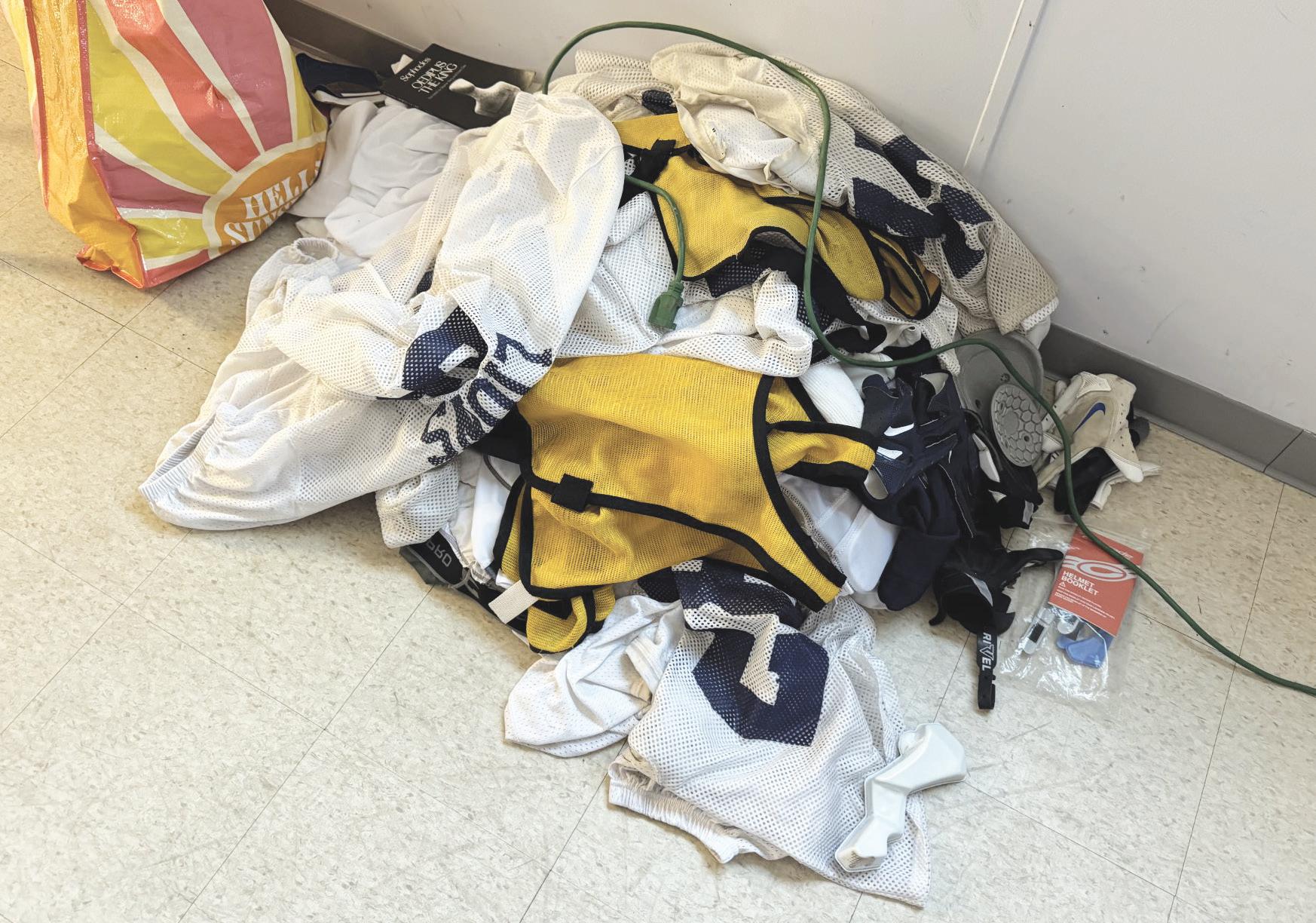 By Akash Manickam
By Akash Manickam
At an all-boys school, hygiene can often be overlooked.
Late wake-ups and first-period tests can often result in tousled hair or unshaven beards.
Last-minute study sessions and forgotten deadlines lead to half-finished lunches and dirty gym bags.
Over time, small lapses in cleanliness add up. And the effects are not limited to messy hallways and study areas.
Students’ mental health, mood and even performance are all affected by the campus’ cleanliness.
And even though the school is far more equipped than ever before in terms of hygiene, there are still areas where the community can be cleaner.
School nurse Julie Doerge has noticed a massive improvement in hygiene on campus since the outbreak of the pandemic.
“Once COVID hit, we had to upgrade certain things, like air quality, in the whole school,” Doerge said. “We invested a lot and improved all of our HEPA (high efficiency particulate air) filters. Even in older buildings, we were able to upgrade the systems, which had to be almost the same as in the new buildings which is awesome. The HEPA filters in every room take out allergens, dust and some germs. That was a huge improvement for the school, and I believe it has helped us even now in our fourth year of COVID to keep people more safe in terms of illness and spreading germs.”
After students grew tired of the restrictive measures put in place during the COVID era, Doerge noticed an expected increase in cases of less concerning illnesses.
“For two years, we wore masks, and we were very healthy,” Doerge said. “We didn’t see any colds, we didn’t see strep throat, we didn’t see the flu. Now that we are back to normal, as everybody wants to be, we see an uptick in both flu, RSV and just regular colds. So we know that the bodies are now kind of going back to their old ways and picking up germs.”
Doerge agrees that the environment of a boys’ school can make cleanliness especially challenging, especially for younger students who are not as knowledgeable on the topic of sanitation.
“I think young men, especially as they come through middle school, don’t actually realize that they might need deodorant and need to take a bath,” Doerge said. “Once they sweat, bacteria multiplies under the arms and other parts of your body, which begin to smell. I also see the dif-
ferent foods that different families eat, whether it’s garlic or it’s turmeric or something else. That also plays a role in how we smell, and I think that can be a challenge. I have been asked in the past if I would call a family about certain kids, and I’m always willing to do that because I think that sometimes, parents or friends will tell you, ‘Dude, you’ve got to do something about this.’”
For young student-athletes, the challenge of maintaining personal sanitation increases exponentially. After hard practices, conditioning sessions or lifts, it can be hard to remember the little details, like leaving equipment out to dry or washing dirty clothes.
Athletic Trainer Natalie Bumpas usually deals with sports-related injuries like sprained ankles or bruised arms, but hygiene issues are equally debilitating for young athletes.
“We’ve had conditions that we’ve had to defer to dermatology just because we’re not sure what they are,” Bumpas said. “We just need to know what it is and get a diagnosis whether it’s bacterial or fungal, so we know how to treat it as well as different medicines to treat it or get rid of it.”
Bumpas believes that hygiene goes beyond what most people think of when it comes to cleanliness. To prepare students for college, she believes they must be taught to wash more than just themselves.
“Hygiene goes beyond just keeping yourself clean,” Bumpas said. “It’s making sure that clothes are laundered regularly, sheets are laundered regularly and blankets are laundered regularly. You need to wash off whatever sweat you have from when you’ve worn them.”
Equipment Manager Ronald Turner carefully washes and maintains every set of pads, jerseys and other equipment used by every sport. For Turner, hygiene maintenance is as important and routine as a helmet or shoulder pad safety check.
“You can get infections because of uncleaned equipment or uncleaned uniforms,” Turner said, “so we specifically request that all uniforms and equipment are kept clean. I can’t emphasize enough how much it means to me.”
While Doerge is pleased with the improvement in student hygiene since she arrived at the school, she believes there is a lot that can still be done to clean up campus.
“We’ve worked really hard on discussing mental health, and I think hygiene also fits perfectly into the theme of taking care of ourselves,” Doerge said. “I think we can always make the school a healthier environment.”
Overheard
10600 at

“American Express is my daddy.”
Bryan Boucher Economics Instructor

“Lock in, please.”
Chia-Jung Chiang Chinese instructor

“Ahsan, I’d rather you learn how to use cologne properly than integration by parts.”
Paul Mlakar Director of Academic Information Sytems

“I’m the Eminem of Oak Cliff.”
Dan Northcut ‘81 Director of Environmental Studies

“I’m feeling romantical.”
Roman Childress Junior
Friday, March 8, 2024 R e M a R ke R Page 15
MUSTY AND DUSTY A pile of unclaimed football gear sits in the locker room.
PHOTO / WINSTON LIN
THE JOURNALS OF REGRET
Regret is something common to all of us. Young or old, there’s always something we wish we could have done better. Something we should have done differently. Some opportunity we just missed out on. Some hold it with them wherever they go. Others try to forget. It’s varied. We asked how some students and faculty about their regrets and how they deal with them.
By Dawson Yao and Linyang Lee
It was his second choice.
Senior Harry Wang had done orchestra in eighth grade. He’d been pretty good at violin, but to be honest, he didn’t really enjoy orchestra that much.
So he picked up debate as a second choice. He wasn’t particularly serious at all. He just showed up at tournaments occasionally with friends.
But after seven weeks of debate camp the summer before his junior year, Wang realized that he actually wanted to be serious about debate.
And partnering up with senior Liam Seaward, they practiced and tried to do well but ended up only with a “decent year”.
Back again to seven weeks of debate camp, they aimed for top 20 in the nation.
But their aspirations never came true. They didn’t do great at the first few tournaments and lost their chance to continue debating at the next bigger tournaments because of their poor results.
Maybe it was just bad luck. Maybe we should’ve prepared more. Maybe I should’ve been serious about this a lot earlier.
He felt that it all stemmed from those first few years of debate — the lack of care and commitment. Regret.
It’s not his first time feeling like this. Sometimes he wishes he had tried harder in school. Sometimes he wishes he had learned to drive earlier.
Regret is something everyone has felt. Breaking a promise. Not working hard enough. Missing an opportunity.
But it’s how we deal with it that sets us apart.
And Wang wants to change it. Get rid of it. He wants to redeem himself in college. Work really hard and see what becomes of his first year of collegiate debating.
But many don’t want change it. Or can’t change it. Don’t want to deal with it. Or can’t deal with it. Don’t learn from it. Or can’t learn from it.
Sometimes, many get stuck with regret.
Regretting. Again and again.
Forever.
For Sally & Edward Genecov Master Teacher Amy Pool, much of her supposed regret comes in the form of life-changing and career-defining decisions.
After acquiring her Bachelor’s degree in Mathematics from Portland State University, Pool was met with a choice, a fork in the road. On the one hand: to stay in school, to chase her Master’s degree and a higher education. But on the other hand: an opportunity to grow, to expand her zone of influence, and to start her career.
It was one or the other. There was no in between.
In the end, Pool chose her education. For her, there was nothing more important than pursuing her passion and her love for learning. And within the next four years, she completed her degree, completing her dreams for higher education.
But yet again, she was met with the same crossroads: a memory of that past. Now, she was given the opportunity to chase another level, and another dream. Once again the two hands were presented to her: to venture out to seek a PhD, or to begin a new chapter, where her life would inevitably change.
Again, it was one or the other. There was no in between.
And nearly 25 years later, it’s clear that Pool’s decision panned out well.
But even despite the success her decisions have yielded, there’s still a fraction of Pool who would’ve pursued her next degree: a fraction fueled by her immense curiosity and love for learning.
“I love being a student,” Pool said. “I would have loved to have done my PhD.”
But had Pool ventured out to secure her PhD, she would’ve found herself in an entirely different field. Had she sought that level of higher education, her environment, surroundings, and area of expertise would have been completely different. Had she done virtually anything differently, she would’ve never ended up teaching the boys of 10600 Preston Road.
“I have a hard time seeing these things as regrets because those decisions ultimately put me on a path that I never would have experienced, and that I would have hated to lose. There are plenty of things I don't regret because I look at the consequence, and admire the positive outcomes of that consequence.
But instead of regretting and lingering on some of the biggest decisions of her life, Pool instead finds her that her most regretful actions in life have come from the small things in life.
In college, Pool, like any other college student, was friends with the people she took the most classes with. Like any other college student, she had study groups, where she bonded with her classmates through late night problem sets and study sessions. Like any other college student, her experience was mostly normal.
But unlike any other college student, one of her closest friends had told her that he was going to commit suicide.
Starting out as acquaintances who had found each other through their shared business major, they transformed into friends who had underwent some of life’s toughest challenges together. When she she struggled, he helped her. When he struggled, she made it her mission to get him through it.
And after a particularly rough patch, where he and his girlfriend had went through a particularly nasty split, Pool had thought that it was going to be much of the same. They had gone through this before: this time was just another, albeit obviously serious instance. Her strategy? Get him committed into helping her do things, so that he always had a purpose.
But then came the thoughts of suicide.
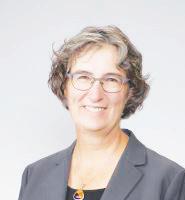
“At one point, he had told me that he was gonna kill himself over (his situation).”
What are you supposed to do, when someone approaches to you with that on their mind?
For Pool, her thought process was much of the same: to keep requesting help in hopes that in the end, it would all be okay.
And it was okay. At the end of the year, Pool had invited her friend to a dinner on New Year’s Eve. At the time, Pool had worked the graveyard shift, so the plans served as a break. It was a way to spend more time together, and to relax.
Around halfway through December was doing exactly that: relaxing after a long day classes preceded by a grueling graveyard shift. But as she slept, she was suddenly woken by a call.
A call? For me?

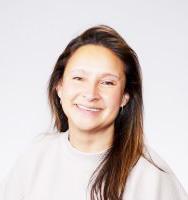
People who knew her well knew of her exhausted schedule, so calling in the middle of the day seemed inopportune. But as she listened to the words that were being spoken, her nightmares turned instantly into reality.
It was her economics teacher, asking her if the name he saw on TV was the same one he knew. A high speed chase, where the driver had shot himself. A suicide.
“And that’s how I found out that he’d actually done what he said he was going to do.”
Up until the event actually happened, Pool was confident in her ability to push through. After all, she had done it multiple times before -
Page 16 R e M a R ke R Friday, March 8, 2024
Amy Pool
Sally & Edward Genecov Master Teacher
Dr. Gabby Reed Director of Marksman Wellness
what was the difference this time? But the instant it happened, it was as if all other questions and routines ceased to exist.
There was nothing to change, nothing that could’ve been done to prevent this exact set of circumstances. What’s done was done, and no matter how much she wanted to, she could never change the past.
But after reminiscing after all these years, there’s still remains one thing that she wish she could’ve. But contrary to any sort of conventional wisdom, she doesn’t regret the big things, rather, she regrets the smaller things. Instead of focusing on massive actions which she could have done to help prevent his death, Pool is, on the contrary, plagued by her inaction in the most common of situations. Like not having made the extra effort to say hello.
And more than 20 years later, these regrets still dominate Pool’s mind.
But from a purely educational and academic point of view, Pool’s regret from her situation is nothing new. According to Director of Marksman Wellness Gabby Reed, the little things are often just as easy to regret than big mistakes.
“I think it's easy to get hung up on the little things, because the little things are things that we feel like we can control,” Reed said.
Reed has seen experiences very similar to Pool’s unfold before her eyes. Most recently, Reed witnessed the implications of the death of her husband’s best friend on her husband.
On any other day, he would’ve picked up the phone. On any other day, he could’ve called him back. On any other day, he would’ve called him back.
But on this day, he decided not to. And so the phone rang, and it rang, and it rang.
Oh, I’m busy. Oh, I’ll call him back.
But some time after that, and without a call back, his friend collapsed, due to a sudden and terrible heart attack. And even though they had shared a myriad of hours together on that very same phone call, it was this last call: this insignificant missed conversation over the phone that Reed’s husband would regret.
“It’s not that often that we have a chance to jump in front of train to save a baby,” Reed said. “But everyday, we make little choices that have massive ripple effects on our lives.
For senior John Zhao, one of those choices came in sixth-grade.
All the other band kids wanted to do percussion. And he did too.
But only ten could get it. Instead, he and the other disappointed sixth graders got their second choices. Zhao had picked the trumpet.
There’s only three keys. How difficult could it be?
And, oh, how difficult it was.
It was frustration beyond anything he’d ever felt. Considering he’d been playing piano since he was five, which had 85 more keys than this hunk of metal, it should’ve been easy.
There were so many things. Intonation. Embouchure. Transposition.
But he stuck to it and practiced. A lot.
“Maybe I could’ve done something better with my time,” Zhao said. “But this is all hindsight. There’s no way I could have known this way back, when I was deciding to play the trumpet, that it takes so much time.”
With that time, he could’ve done an extra science elective. Maybe done some computer science ahead of college so he wouldn’t have to start all over with learning something new. But Zhao doesn’t dwell on it too much.
“When I decided to join band, I knew that I was going to have to sacrifice some time for it,” Zhao said. “I just used the knowledge that I had at that time to make the best decision on what to invest my time in. And if that ends up not being the best investment, then what could I have done?”
Latin instructor Dr. Andre Stipanovic once dreamt of playing on the big stage. Of making it big in the music industry.
And going into college, he was debating whether he wanted to go full time into music — with his guitar skills he’d picked up in high school — or just stay in school.
But he chose, ultimately, to study computer science at the College of Engineering at Rutgers. He knew it was his opportunity to get an education, and he still had the chance to play in groups at college too.

His classes were interesting enough — it just wasn’t his passion. It wasn’t what he wanted to do — except, he really didn’t know what he wanted to do. His father had told him for years that the College of Engineering was the way to go, and after Stipanovic had gotten out of the army, he was told that computer science was the future.
Before then, Stipanovic had never taken a Latin class. He’d taken French and German in high school and hadn’t had room to fit a Latin course in.
It was only in college that he had the opportunity to try out other subjects, finding his love for Latin in the process.
Sometimes — like in his graduate work — he wishes that he’d started Latin sooner. Guitar too. But, like Zhao, he doesn’t like to dwell on it.
“I always remind myself in the morning of memento mori — remember that you are going to die,” Stipanovic said. “Every day you’re alive, it’s one more thing to be grateful for and one less thing to regret.”
“EVERY DAY YOU'RE ALIVE, IT'S ONE MORE THING TO BE GRATEFUL FOR, AND ONE LESS THING TO REGRET.”
- Dr. Andre Stipanovic
said. “In many Hispanic cultures, for example, they hae more faith-based approaches. So if something doesn’t go their way, or if something doesn’t go right, they sort of go, ‘Well, God willed it to happen like this.’”
According to Reed, one of the best ways of dealing with regret is to simply learn from it - to harness that which makes one hurt, and apply it to different facets of his or her life.
“[Regret] was rated highest on a list of negative emotions in terms of fulfilling some pretty positive functions,” Reed said. “It can help us make sense of the world, and it can help us avoid future negative behaviors.”
The true dangers of regret come from complacency. Though it is beneficial to think back upon the past and methods to improvement, dwelling in the past and focusing on a past mistake is dangerous.
“When we get stuck in regret, all we can think about and ruminate about is how much better life could be if a difference choice was made,” Reed said. “That can lead to depression, it can mess with our immune system, and it can lead to anxiety.”
Like in the cases with Pool and Reed’s husband, one of the most common forms of regret comes in the form of not having interacted enough with a loved one. It is this inaction that can eat away at people, and propel them into darkness. But with a couple minor changes, these deeply harmful experiences can be turned into teach valuable lessons.

Stipanovic still has regrets, though. And to him, it’s fine. It spurs growth — it keeps him vigilant about his actions. It’s made him make sure to stand up for his friends and try to be closer with his brother. Not knowing his passions for Latin and guitar from the start has allowed him to meet all sorts of different people from his varied experiences.
And ultimately, he feels it’s necessary.
“You can see it in literature,” Stipanovic said. “Literature is just a record of human experience. Even if it’s fictional, it’s still based on what people actually do. Show me one really good piece of literature that doesn’t have regret in it. It’s all there. It’s in Dante. It’s in the Aeneid. It’s in Homer. It’s everywhere.”
Reed defines regret as that state of looking back in hindsight on something, and wishing that you could have done differently.
“[Regret] often occurs when you imagine that alternative outcome that you wish had happened: one where you maybe made a different choice or decision,” Reed said.
But though the feeling is essentially universal across humans around the globe, different cultures have different approaches of interpreting and reacting to regret. In a country where individuality and perfection is strived for, like in the United States, regret runs rampant. On the other hand, with communities that are more collectivistic, regret is less common.
“These cultures that value community more, they people who see themselves more as like, part of a bigger group, and they take less of the blame on themselves,” Reed
That regret from death implores us to care more deeply about the people currently around us. It forces to us to love harder. It forces us to hug a little tighter. It forces us to care more.
“It’s regret avoidance,” Reed said. “In the end, you’ll be able to look at yourself and go, ‘I did what I could have done and more.”

LOOKING BACK
Regrets never truly leave, and for many, regrets follow them around everywhere they go. Everyone looks back on their regrets from time to time.
F ocus | R e M a R ke R Friday, March 8, 2024 | P age 17
Dr. Andre Stipanovic Latin Instructor
John Zhao Senior
GRAPHIC / JOSHUA GOFORTH

Students bond through class competitions
In order to relieve stress and bond with classmates, Marksmen create grade and inter-grade competitions, unifying the Upper School beyond the classroom.
By Matthew Hofmann and Christian Warner
Tie game. Sweat dripped down the player’s face, running to the tip of his nose before falling to the court below. The hardwood floors squeaked as the players shuffled around in perfect chaos. Around the court, droves of students and teachers watched intently as the game played out.
With only one varsity basketball player on the court to lead, the ball was passed around in a disorganized fashion.
A palpable energy filled the air as the ball hurriedly moved from player to player, eventually landing in the hands of Senior Harry Wang. Gracefully rotating his body, he lifted his eyes to the orange rim, brought his hands up into shooting position, and swiftly arced the ball through the air.
The gym stood still as the ball flew in the air, passing through the net with a swish. The court erupted. The droves of people flooded the court, crowding Wang and jumping around in excitement.
This legendary game-winner marked just one of the many great memories of the Senior Basketball League, an intramural sports league run by the Class of 2024 for the past three years.
And for the Class of 2024, this basketball league has been one of the most unifying experiences in the entirety of high school, serving as an example of the class activities each grade competes in.
Halfway through sophomore year, current seniors Alex Barrett and Bryan Graham wanted to create a fun way for their class to bond. With the basketball season in full swing and drawing inspiration from the Class of 2022’s 3-on-3 basketball league, the idea quickly developed into a sophomore-only basketball league.
The league consists of co-commissioners Barrett and Graham, a social media manager and eight teams of five with captains who draft the teams.
“Alex and I were the catalysts to begin the league,” Graham said. “We set up the draft and did that work and so that is why we have continued to lead it these past few years.”
Following the online draft and the creation of an Instagram account, the Sophomore Basketball League (SBL) was finally born.
As a grade with their first year in high school overshadowed by struggles with the COVID-19 pandemic, this seemingly simple idea unified the grade and helped establish deep bonds that would last throughout high school.
The first season of the SBL played out flawlessly, with the Instagram gaining a large following and the championship coming down to the wire. That year, Graham’s team won the league and earned a handmade wooden trophy.
As the Class of 2024 returned for their junior year, the SBL received a rebranding, turning into the Junior Basketball League (JBL).
Throughout the arduous work of the school year, the league continued its purpose of unifying the class, consistently drawing large crowds during lunch when
“THIS (LEAGUE) HAS REALLY BROUGHT EVERY PART OF THE GRADE TOGETHER TOGETHER TO ROOT FOR EACH OTHER. THERE HAVE BEEN SO MANY GREAT MOMENTS...” Bryan Graham
students could have been doing homework or studying.
“It has been really cool to see so many different groups of guys getting together at lunch,” Graham said. “It’s cool that they find a common thing to cheer for. Whenever we do signups, more than half the grade signs up. Not everyone gets drafted, but those kids who don’t get to play all still come out to watch and I think that is super cool.”
Reflecting on his junior year, Graham believed that the JBL was one of the highlights that made the difficult year a good one. And with such success over the past two years, more than half of the Class of 2024 signed up to compete in the final installment of the league — the Senior Basketball League (SBL).
This year, Graham returned to captain
one last team — Mogwarts Elite — as he made another attempt to win the coveted championship. There is a unique, exciting feeling this year with a tinge of sadness, as the seniors play through the remaining games of a central part of their Upper School experience.
“This (league) has really brought every part of the grade together to root for each other,” Graham said. “There have been so many great moments, like everyone storming the court after a game-winner, and that has been some of my favorite moments.
Sometimes, during a mentally exhausting day, students just want some time to enjoy themselves. And for sophomores, the biweekly class sports event becomes a hotspot for laughs, chatter and memories.
With inspiration from the Class of 2024’s basketball league, the Class of 2026’s Student Council members organized the Sophomore Olympics. As freshmen the year before, they founded the Freshmen Dodgeball Association and decided to change the format to include more sports: football, soccer and basketball. The competition features eight teams, each with a captain who drafted team players on Dec. 5, 2023.
In the past, Student Council representatives have had the responsibility to manage and plan class meetings. During sophomore class president Andrew Zhang’s freshman year, he and the Class of 2026 felt that the meetings were boring and repetitive, so they needed to make a change.
“It’s been fun to have everyone really involved, and it definitely boosts the spirit for the entire grade as a whole,” sophomore Ian McGowan said. “It’s also a lot more interactive than the class meetings and gives us a time to hang out and do things with people who you wouldn’t normally.”
A primary focus of the school is for every student to be comfortable and trusting of one another. Without this, days may become dreadful and intimidating for some.
“One of the great things about (the league) is it puts a spotlight on people who aren’t always seen as outgoing,” Zhang said. “I remember after the first game I got to see how happy and supportive everyone was, and I think it’s just a beneficial thing for
P age 18 | Friday, March 8, 2024 R e M a R ke R | L ife
PHOTO / WINSTON LIN
FAST BREAK Sophomore Spencer Hopkin looks for a bucket, with sophomore Enzo Henry tracking him down

(our community).”
In terms of community building, students are given the freedom to start clubs, study groups and even dunk contests. Yet for many grades both young and old, they choose to spend their time in a sports league founded by a peer.
“The fact that you’re all on a team working for a shared goal and the feeling that you’re in it together (means that) you share the joys of success and the sadness of failure,” Zhang said.
For sophomore class secretary Reagan Graeme, the grade’s Olympics have been a product of analyzing the past sports leagues and building upon them. Rules or games that had a consensus approval were kept, and the opposite also held true. One change, for example, was formatting the teams to now draft players from different advisories and cliques. Graeme hopes that students will build upon their relationships with each other.
“The importance of building strong relationships with each other helps us all be in a comfortable environment where we can do well,” Graeme said. “It’s really cool to see everyone rally around and support someone who is participating in the Olympics, and it shows how strong our community is.”
sentatives agreed to begin a series of competitions. Competitions have included tugof-war, a flag football game, a basketball game and a soccer penalty shootout.
For the Class of 2025, these events are extremely memorable. For junior Mateu Parker, tug-of-war created fond memories.
“The sophomores (Class of 2024) leading up to the event were talking a lot of trash and thought we didn’t stand a chance to their formidable power,” Parker said. “But the freshmen decided to rally, and come the day of tug-of-war, we got to work. I remember, as the rope passed the finish line, I felt joy and a sense of contentment that I had made my school life more complete.”
Parker believes that the main benefit of class-wide events is the unity and friendship they foster.
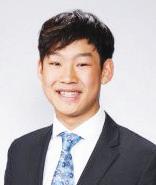
“Competition invites friendship because two people competing against each other will respect each other,” Parker said. “A game is a great way to make friends. When you put students into a situtation that is not academic, it takes stress away and makes kids a lot happier.”
These inter-class events have served as an opportunity for students in either grade to connect with those in other grades, leading to great Upper School unity.
Not only are grade events coordinated within the class, but grades also compete with each other often. One of the longest-standing competitions is between the Class of 2024 and the Class of 2025.
When the Class of 2025 entered high school, both grade’s Student Council repre -
But whether a competition is within a single grade or across grades, the goal is the same: to create opportunities for Marksmen to bond with each other and to brighten the daily schedule of busy students. And according to Graham and Zhang, the SBL and Sophomore Olympics have done just that.



L ife | R e M a R ke R Friday, March 8, 2024 | P age 19
PHOTO / COURTESY MICHELE SANTOSUOSSO
LOCKED IN Above, sophomore Spencer Hopkin shoots during a Sophomore Olympics basketball game. Below, sophomores smile as they watch their classmates play during lunch.
Andrew Zhang Sophomore class president
SPLASH Senior Zach Olyan shoots a 3 in a heated game of theJunior Basketball League
PHOTOS / WINSTON LIN
PHOTO / WINSTON LIN
CAPTIVATED Cheering on from the sidelines, sophmores enjoy their classmates competing the grade games played during lunch.
LCox recalls Alaskan adventures
By Akash Manickam
atin instructor David Cox is no stranger to adventure.
As a broke, thrill-seeking 20-year-old, he knew he needed something to jumpstart his life and give him a new view of the world.
But Cox did not follow the traditional path of a young man in search of meaning. Instead, he traveled across the country to Alaska.
His time there, filled with crazy tales of rough seas, wild bears and strange men, changed his life forever.
Cox made the decision to venture to Alaska with a friend spontaneously.
“I was 20 years old, and I was kind of a romantic,” he said. “I had read Moby Dick that year in college and I thought it was time for me to have my Ishmael experience.”
By hitchhiking and riding buses and planes, the duo made their way to the town of Sitka, Alaska. With a population of around 8,000, Sitka is just outside the top 10 largest cities in the state.
“The town of Sitka is mainly one road on an island that is probably 10 percent inhabited,” Cox said. “The rest of it is deep, old forests, pine trees that you can’t reach around. We stayed in a camp that was all the way out at the end of this road.”
At first, Cox took a job as a taxi driver to make ends meet. While he spent most of his time shuttling intoxicated locals around in the early hours of the morning, one particular customer was different from the rest.
“Usually, they were friendly and sat in the front or in a seat where they could talk to me,” Cox said. “This guy sat right behind me, which was weird. And then, as I was driving back into town, the dispatcher’s voice came on and said, ‘Hey, Dave, be careful out there. Some guy’s got a knife, and he’s been slashing tires.’ And I knew the guy behind me was that dude.”
Not sure if the man would move from slashing tires to throats, he slammed on the brakes and jumped out of the car. Simultaneously, three police cars rounded the corner, grabbed the man and arrested him.
About a week after the terrifying encounter, a German man named Helmut offered him a new job on an old fishing boat. He accepted immediately, as fishing was what he dreamed of when he imagined a new life in Alaska. Quickly, he realized that the fishing life was anything but glamorous.
“The captain assured me that it was safe,” Cox said. “He told me we had survival suits on the boat, but I never knew where they were.”
Cox went into the halibut fishing business and spent his first day at sea learning how to tie all kinds of knots.
“The entire time I was thinking, ‘this isn’t so bad,” but what I didn’t realize is we were going up what’s called the inside channel, between all these barrier islands,” Cox said. “It was almost like going up a river. Helmut suddenly cut between two islands and we were right on the high seas. I spent the next 24 hours puking my guts out.”
The experience was so traumatic that Cox considered jumping overboard and swimming to land, a thought that was quickly extinguished when he recalled the frigid water temperatures that would cause hypothermia in 30 minutes.
After a while, Helmut made the inexperienced sailor force down a potato dish and chew some tobacco, and Cox’s seasickness vanished.
After the brutal period of seasickness, Cox believed the rest of the journey would be smooth sailing. Instead, he was introduced to one of the most dangerous jobs in the world - halibut fishing. At first, Cox worked a job that involved handling fast, sharp hooks that
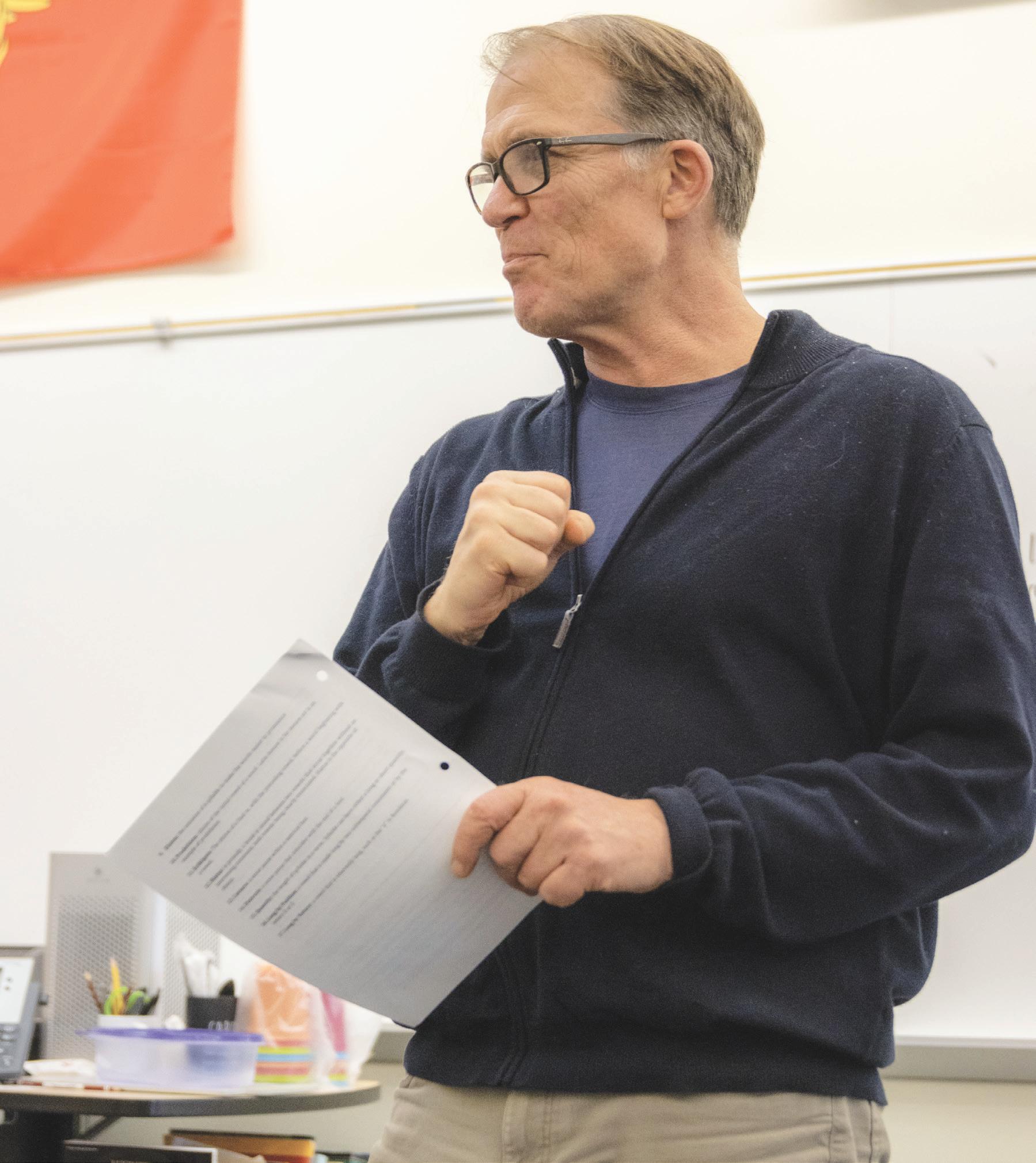
could carry an unwitting sailor into the ocean below. After a few harrowing days, he was lucky enough to be tasked with gutting the fish, a much safer job. Cox soon learned that only a certain kind of person could thrive during halibut season.
“My shipmates were all a little crazy,” he said. “You’ve got to be a little crazy to be a fisherman anyhow. As I was cutting a fish, he reached in and ripped out the heart, still beating, and swallowed it whole. He said, ‘You dare me?’
And I said, ‘Yeah.’ He didn’t ask for money or anything. He just popped it in his mouth and swallowed it.”
Cox eventually returned to the lower 48 states, hitchhiking back down the western coast of America. Eventually, he landed a job as a teaching intern at Phillips Academy in Andover, Mass. After a few other teaching tenures, he arrived at 10600 Preston Road.
“MY SHIPMATES WERE ALL A LITTLE CRAZY. YOU’VE GOT TO BE A LITTLE CRAZY TO BE A FISHERMAN ANYHOW. ” - David Cox
Growing up near Canada, Cox’s first experience with language studies came in an elementary school French class. When he entered high school, he decided to add another language to his lexicon, and he started to learn Latin. Even though Cox loved the study of Latin, his career as a Latin teacher almost ended before it even began.
“I went off to college thinking I would go into engineering,” he said, “so I took the entry-level calculus classes. And it was my worst academic
experience. The teacher was so bad—this is an Ivy League school, by the way—that kids either dropped out or stopped going, and I was one of them. I couldn’t understand what he was saying. I couldn’t understand his instruction at all.”
In order to pass that calculus class, students needed to receive at least grade of at least 60. Cox finished the year with a 61.
“Yeah, it came right down to the wire,” he said.
While Cox struggled through derivatives in that introductory calculus class, he found solace in a small, engaging Latin course.
“The teachers remembered me, they addressed me by my name, they would have a party for the class at the end of the year, and I thought, ‘These people are civilized.’”
After deciding to focus on Latin, Cox never looked back.
Throughout his life, one piece of advice has kept him afloat and given him the strength to pursue his goals.
“I went through a tough time when my first marriage did not work out,” he said. “I was down in the dumps. And my father, who was a very literary guy, sent me a very supportive letter with a quotation from Emerson.”
Emerson stated that he admires the kid from Vermont rather than a Harvard graduate who has gone to the best schools and had enorous support all his life.
“Emerson always preferred the farmer who’s done it all and failed at everything, and always like a cat, he lands on his feet,” Cox said. “You don’t necessarily have to have your life carefully planned out and programmed. Even after really difficult failures, you’ve got to keep believing in yourself, being able to bounce back from disappointment and to be resourceful and also to sort of try new things. Maybe you didn’t win this time, but you will the next time.”
A WEALTH OF EXPERIENCE
Cox was not initially planning to become a Latin teacher, but he eventually dropped engineering to pursue the language.
P age 20 | Friday, March 8, 2024
Latin instructor David Cox recounts his experience as a young man living and working in Sitka, Alaska, revealing the unusual and exciting circumstances of his journey to the last frontier.
PHOTO / WINSTON LIN
Seniors shine in musical competitions
 By Joshua Goforth and William Kozoman
By Joshua Goforth and William Kozoman
Seniors Winston Miller and Miller Wendorf have achieved so much in the Fine Arts Department.
Even though the choir and orchestra programs are some of the most decorated in the school, two students’ accomplishments stand out above the rest.
Miller and Wendorf recently achieved all-state recognition in their respective fine arts: choir and orchestra. These awards add on to their already impressive resume, as the two are also members of the Fine Arts Board and are avid performers in a variety of different productions and groups.
But their accomplishments did not come easy; the awards are proof of the hard work they have put in year in and year out, starting from a young age.
Miller was first introduced to singing 1,000 miles away in the city of Las Vegas, Nevada, where his mom enrolled him in a small private school. As the son of the school’s Music Department Chair, he was constantly immersed in the world of the performing arts and quickly developed a passion for singing.
“My parents encouraged me to join choirs, whether they be in church, school or other places like that,” Miller said. “When I came to St. Mark’s, I very much had the choir in mind.”
As Miller’s family relocated and settled in Dallas during his time in middle school, he began to see choir not just as a performing art but also as a way to connect with others. The close relationships Miller would form and the skills he would gain working in coordination with other choir members were essential to how he approached school and his life.
“Choir taught me that whether it’s through a sport, a club or an extracurricular it’s important to have a community,” Miller said. “You’re a huge group trying to perform the same piece of music. It’s not always good to be by yourself and do things alone.”
Wendorf followed a similar path. He picked up the cello as a fourth grader at an international school in Switzerland, and from there, his love for the instrument soared. However, his passion did not automatically translate to skill. Instead, Wendorf credits consis-
tency and hard work as the driving factor behind his achievements.
“It’s the years of practice that led me to get to the level where I could do all-state in ninth grade,” Wendorf said.
But individual success doesn’t translate to the success of an entire orchestra, either. Through years of experience, Wendorf, like Miller, soon discovered what makes a polished orchestra: the ability to swallow your pride and perform as a group.
“The experience of playing in an orchestra teaches you a lot about communication because you’re just one cog in a much larger machine,” Wendorf said. “You can’t have an ego and play… it’s kind of a humility-inducing experience.”
The years of dedication and consistency Miller and Wendorf have both shown are not going unnoticed. They have received numerous accolades, including most recently the fourth of four consecutive years of all-state honors. For Miller, the awards do much more than recognize his own success, as he believes they also recognize the hard work of his parents.
“The awards are a testament to the dedication and provisions of my parents,” Miller said. “They had a steady and constant push for me to keep choir in my life. When I was brought up on stage for being a fouryear all-state chorister, I couldn’t really think of any other reason why I was there besides my parents,” Miller said.
However, the thing they both have enjoyed the most hasn’t been the acclaim; it was the experience of performing at all-state itself.
“The concerts themselves have been some of the most rewarding musical experiences that I’ve ever had,” Wendorf said.
Even beyond the choir and orchestra, both Miller and Wendorf have had a lasting impact as avid performers in SMAcapella, in the school’s Drama productions and at its Coffee House. Most recently, they sang as a duet in this September’s Coffee House, reprising their performance from March of last year.
“Miller and I were able to sing not one, but two songs for Coffee House,” Miller said. “It’s one of my favorite memories. Singing with somebody you’ve been
performing with for years and you’ve known for years is very wholesome and fulfilling.”
Wendorf shared the same sense of fulfillment looking back at his moments performing with Miller.
“I feel like our hard work is paying off at the same time,” Wendorf said. “We’ve both worked really hard for this.”
As the two seniors grow into the next stage of their lives, they face the question of how to further pursue their musical endeavors. But no matter where they might end up, they both plan to continue living out their passions.
“It’s hard not to love choir,” Miller said. “I don’t think I could manage college without music in some form or capacity.”
And although the future is uncertain, their experiences performing at the school will stick with them far after they leave.
“I’m not sure what it will look like, to be honest,” Wendorf said. “But I’ll miss being able to do it all like I have here.”
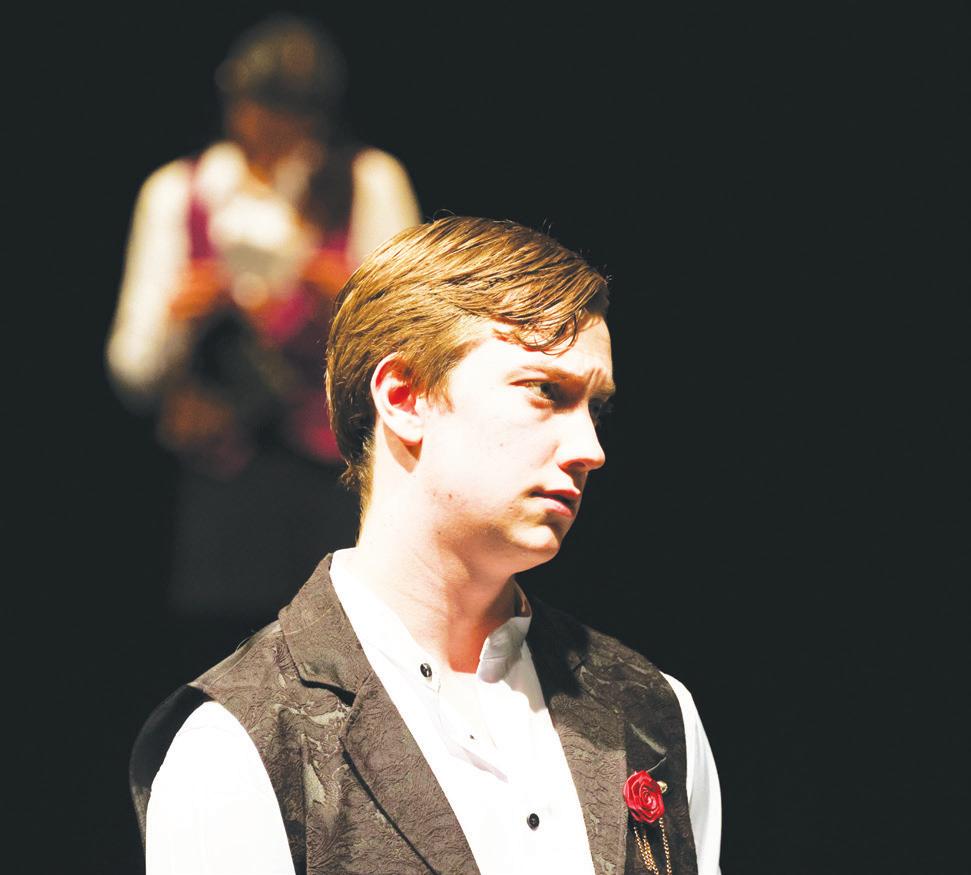
L ife | R e M a R ke R Friday, March 8, 2024 | P age 21
Seniors Miller Wendorf, in orchestra, and Winston Miller, in choir, have now achieved all-state recognition for all four years of their high school career.
PHOTO / COURTESY DONNA DONNELL SINGING SOLO Senior Winston Miller performs a solo for the school choir.
FALL PLAY PERFORMANCE Senior Miller Wendorf plays the role of Romeo in Romeo and Juliet.
PHOTO / DILAN KOGANTI
Vacation essentials
With Spring Break right around the corner, head writer Vikram Singh reviews must-have items and essentials to elevate any trip. From sunglasses to bluetooth speakers to swimwear, here are the best items for the upcoming week.

Ray-Ban Wayfarers bring defense, style
A classic piece of gear, Ray-Ban Wayfarers, skillfully combine fashion and utility. These sunglasses, which are well-known for their distinctive shape, have established themselves as a classic in the world of eyewear.
The Wayfarers' timeless style transcends fads and becomes a wardrobe mainstay thanks to its adaptable and durable design. Their unique form accentuates different facial shapes and gives off an effortlessly chic vibe that is always in.
Whether you're dressing for a formal occasion or going casual for the weekend, these sunglasses blend well with anything. Beyond just being stylish, Ray-Ban Wayfarers are incredibly versatile.
Made from sturdy materials and equipped with premium lenses, they offer superior defense against damaging UV radiation without sacrificing visual clarity.
These sunglasses provide dependable sun protection together with flair, making them perfect for sunny days spent driving or relaxing by the pool.
They're an essential piece of gear for anyone trying to add some vintage elegance to their ensemble.

UE Boom
speaker durable, powerful
The UE Boom speaker is a portable powerhouse that packs amazing sound quality into a small form factor.
It is visually striking with its cylindrical shape and vivid color options and also packs a punch with it's outstanding audio performance. Whether you're listening indoors or outside, the 360-degree sound projection makes sure that the music fills the space evenly.
The UE Boom's durability is one of its best qualities. This speaker is weatherproof, made to withstand the rigors of outdoor use and water resistant.
You can rely on the UE Boom to maintain the music playing whether you're trekking or just relaxing by the pool. The UE Boom app lets you customize the sound settings and even enable wireless connecting with additional UE speakers for a stereo sound experience.
All things considered, the UE Boom speaker is a great option for anyone looking for a dependable and adaptable portable speaker solution because of its outstanding sound quality, portability and durability.

Bird
Dogs offer comfort, swag
The most important factors in swimwear are comfort, style and durability. All of these characteristics are readily embodied by Bird Dog Swim Trunks, which makes them an exceptional option for anyone looking for premium swimwear without sacrificing style.
Above all, Bird Dog Swim Trunks are incredibly high quality. These swim trunks, which are made of excellent materials, feel opulent against the skin and will last through many beach excursions and poolside lounging sessions.
The brand's dedication to excellence is evident in the meticulous attention to detail used in its construction. Bird Dog Swim Trunks come in a variety of styles, which is one of their most alluring features.
Bird Dog offers a variety of styles to suit any style preference, from statement pieces to more subdued looks.
Knowing that you're wearing stylish and long-lasting swimwear gives you peace of mind whether you're hitting the beach or the pool.

L ife | R e M a R ke R Friday, March 8, 2024 | P age 22 REVIEWS
RELAXATION For many students traveling over Spring Break, a relaxing trip to the beach is often the perfect break from their busy schedules at home, gving them the opportunity to enjoy the ocean.
SUNGLASSES
BLUETOOTH SPEAKER
PHOTO / COURTESY CREATIVE COMMONS PHOTO /
PHOTO / COURTESY
COMMONS
SWIMWEAR
COURTESY CREATIVE COMMONS
CREATIVE
PHOTO / ZACK GOFORTH
Friday, March 8, 2024

Staff
Tejas Allada, Weston Chance, Joshua Goforth, Chris Guffey, Kevin Ho, Michael Jimenez, Rohan Kakkar, Ronit Kongara,
administration, faculty or staff. All personal opinion columns, bylined with the writer’s name and photo, represent the views of that writer only and not necessarily those of the ReMarker, Board of Trustees, administration, faculty or staff.
Online www.smremarker.com
Instagram @remarkernewspaper
Reader Involvement
The ReMarker encourages reader input through guest columns and story ideas. Contact the appropriate editor for suggestions.
Letters to the Editor
Letters to the editor are welcome and encouraged. They must be typed, signed and not exceed 300 words. Submissions are not accepted.
Membership
The ReMarker maintains membership in the Columbia Scholastic Press Association, New York City, NY; National Scholastic Press Association, Minneapolis, MN; and the Interscholastic League Press Conference, Austin.
Staff Editorial

Rooting for change: the growth of student choice in education
While attempting to promote student curiosity, the current course selection requirements are stifling for many Marksmen and should be adjusted.
In the center of the Quad lies a grand old tree. Its roots extend in all cardinal directions, symbolizing the vast, unique backgrounds of Marksmen, with each root representing a student's individual journey. It stands tall, and its branches split the sky.
Yet, an unwelcome pruner trims away the potential of the sprawling branches. This pruning, while intended to shape, inadvertently restricts the tree's natural growth, echoing the limitations placed on students' explorations and the full bloom of their potential by restrictive course selection standards.
A specific point of contention with many students is the mandatory Physical Education (PE) classes during students’ freshmen and sophomore years. For multi-sport athletes this feels particularly misplaced. These students, who already dedicate a significant portion of their time to training and competing, find the PE mandate a misappropriation of their valuable time. Their rigorous training schedules and competitions already surpass the physical activity and educational goals that PE classes aim to achieve, making these mandatory sessions feel more unnecessary than beneficial.
This situation calls for a nuanced approach, one that recognizes the already substantial physical en-
gagement of multi-sport athletes.
By reevaluating the necessity of PE classes for these students, the school has the opportunity to support the dedication and discipline it takes to excel in multiple sports. Such a shift would free up athletes' schedules for academic pursuits or advanced training in their respective sport, ultimately accomplishing the same goal as the stifling requirement.
Outside of athletics, other standards— needed for graduation — restrict students’ ability to choose their own courses. By following the recommended course path, students are not able to deviate until their junior year, and even then, their choices are still heavily bound.
This rigid structure, ostensibly designed to streamline the journey towards graduation, paradoxically narrows the intellectual exploration that education is supposed to foster. The essence of learning — curiosity, exploration and discovery — is curtailed, as students are ushered down a well-trodden path with little opportunity to stray into the woods that lie just beyond the prescribed curriculum.
To pursue a non-required course, students must meticulously plan from their freshman year, ensuring it fits alongside mandatory graduation requirements. To facilitate this, advisory course selection meetings
in freshman year should explicitly detail all graduation requirements, ensuring students are fully equipped to plan their academic journeys with foresight and clarity.
The scarcity of one-semester courses within the course selection framework further exacerbates the challenges students face, particularly when the few available options do not align with their interests or academic goals. This dearth of offerings means that students, eager to take advantage of the flexibility that one-semester courses provide, are forced into a corner. They find themselves having to choose from a scant assortment, which leads them to enroll in classes that spark little to no interest for them.
Increasing the availability and diversity of one-semester courses, such as adding additional subjects, would provide the much-needed flexibility in the curriculum and allow students to fully branch out and explore their interests.
By implementing these solutions, we can begin to reshape the educational landscape and allow students to naturally grow into their educational journey. Ultimately by allowing Marksmen greater freedom in their course selections, we allow them the ability to assume responsibility and take control of their own education paths.
BRANCHING OUT Like a pruned tree, too restrictive course requirments shave off students' full potential and disallow full intellectual curiosity and exploration.
/ JOSHUA GOFORTH
GRAPHIC
Student Newspaper of St. Mark’s School of Texas 10600 Preston Road Dallas, Texas 75230 214-346-8000 EDITORIAL BOARD Editor-in-Chief Zack Goforth Managing Editors Nolan Marcus Grayson Redmond Digital Editor Ben Adams Editorial Director Aaron Augustine Focus Editors Linyang Lee Dawson Yao Design Director Noah Cathey Photo Editor Zachary Bashour SECTION EDITORS Issues Arjun Poi Hilton Sampson Academics Oliver Peck Joseph Sun Life Matthew Hofmann Akash Manickam
Lawrence Gardner Neil Yepuri Assistant Digital Editor Will Clifford
Writers Vikram Singh
Sports
Head
Eric Yi
William Kozoman, Winston
Doan Nguyen, Christian Warner, Andrew Ye, Kayden Zhong
Jenny Dial Creech
David Dini Audience The ReMarker is intended for the students, faculty, staff and alumni community of St. Mark’s School of Texas. Press run is 4,000 copies, with more than 2,600 of those mailed out to alumni, courtesy of the school’s offices of External Affairs, Development and Alumni divisions. Opinions and Editorials Editorials represent the views of the Editorial Board and are not necessarily those of the Board of Trustees,
Lin,
Adviser
Headmaster
R e M a R ke R Page 23
ACADEMIC GRADUATION REQUIREMENTS 4 years of English 3 years of the same language 3 years of math, at least Algebra II 3 years of history 1 fine art class 1 elective class 3 years of laboratory science
Lessons from two allegedly mature seniors
NEVER BACK DOWN Senioritis is (unfortunately) a myth
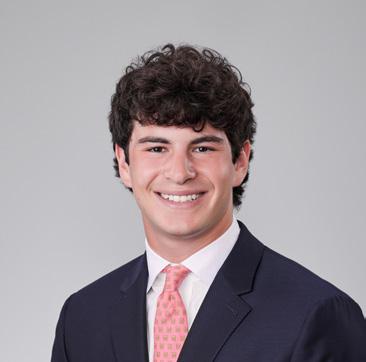 Nolan Marcus Managing Editor
Nolan Marcus Managing Editor
Second semester of my senior year.
After 11 1/5 years of pushing myself, I have climbed my last mountain.
No more late nights working on projects or grinding out English essays. James, I think we had our last phone call studying for math tests.
I’ve heard about this phenomenon over the years. This thing called senioritis and I never thought about what it meant or that I would get it. And now that I’m a senior past the month of January, I think I kind of get it.
Senioritis means many things, but two primary components come to mind. The first, lack of motivation to keep myself disciplined to continue doing all my work to the best of my ability at all times. The second, pending finality.
But that finality doesn’t mean I have crossed the stage, diploma in hand. So I still actually have more school.
I hadn’t considered this part.
Obviously I knew I still had responsibilities, writing speeches, working on this paper, building houses and watching Alex Barrett, Adam Kappleman and Holden Browning carry me to SBL victory every week.
And of course, I knew I wanted to show up to school with the same smile and positive energy I have always tried to bring to school every day.
But what else is there to do? Oh yeah, school.
I started my second semester off not too strong with three Cs on major assignments in three different subjects, all in the same week.
The wake-up call I most definitely needed.
Nolan, you are still a student, do your work.
So what have I learned since staring down the last leg of my St. Mark’s race?
I have learned about the AD/AS curve in AP Macroeconomics, I have learned what Iambic Pentameter is, how to block a play, how to solve an integral, a lot about special operations and some fun InDesign tricks.
Most importantly, I learned that school treks on regardless of who is wearing the blue shirt and regardless of the time of year.
So ever since I have been jolted out of my senioritis I have made a marvelous academic recovery with some of my best grades of the year, and even though I’m working as hard as ever, despite my preconceived notions of second semester senior year, I’m loving every second of it.
James, there will be more late night math related phone calls, I will keep grinding on essays and poems, and I’ll finish as strong as I started.
PERSONAL COLUMN
COURT CHAOS
Mock Trial: a helpful failure

As a member of the newly-minted mock trial team, I was filled with visions of courtroom brilliance — outwitting opponents and winning arguments with careful manipulation. I imagined the team effortlessly gliding through regional tournaments, dominating the state championship, and shining on the national stage.
This confidence seemed contagious, and it made us overlook the essential groundwork for success. We believed ourselves to be entirely infallible, so our preparation was casual at best. Meetings were sporadic, with little commitment to learning our roles fully. Scripts remained untouched and unmemorized. We quite frankly, sucked.
Reality hits hard. It was a clean sweep — two of the most crushing losses and a harsh lesson in humility. We dreamt of flying high with the Sun but didn’t even know how to walk.
In the aftermath of those defeats, I felt pretty embarrassed. Here I was imagining what nationals was like, and we didn’t even end up putting up a competitive fight in the regional competition — yikes.
With failure comes reflection. Yes, having lofty goals and aspirations is important, but reaching such heights demands a foundation of daily effort. True change, I realized, is achieved through persistent, everyday steps.
With this understanding, the team’s focus changed. Instead of chasing trophies, we dedicated ourselves to steady improvement. We embraced regular weekly practice, the memorization of roles and scripts, and invaluable advice from local clinics, teams and Ms. Wright. Everyone on the team came together and committed themselves to the common goal of improvement.
The result? Well, while we may have fallen short of regionals yet again this year, we actually won a round and didn’t get absolutely gutted in the other two rounds.
The initial moment of failure, as disappointing as it was, taught us an invaluable lesson: change, whether in the courtroom or in the wider world, is crafted from consistent, daily effort. Through my participation in Mock Trial, I learned that to fly — one must first learn to walk the journey of consistent dedication and work.


Report Card
Spring Break
The week leading up to Spring Break, while not a terrible work load, left a lot to be desired.

Parking
With the fence around the new lot gone, many have begun to wonder about the status of the new lot.
Multicultural Night
From live music to free food, Marksmen Multicultural Night was both incredibly fun and informative.
Wearing legacy: the Lion's Closet and the threads of tradition
 Arjun Poi Issues Editor
Arjun Poi Issues Editor
A week before school starts, a corner on campus buzzes like a community farmer’s market on a nice summer day as students and parents rush to buy uniforms and spirit wear for a fraction of the price they are generally sold for.
It’s the Lion’s Closet.
Since I came to the school in sixth grade, I didn’t have a senior buddy to carry me across the Great Hall during Christmas convocation or guide me through my early years at the school. I couldn’t relate to the ideas of “legacy” and everything the statue of the older Marksmen carrying the younger Marksmen stood for.
Until, one day, as I was wearing my gray uniform shorts, something caught my eye that led me to take a closer look. A small tag on the
inside waistband said, “Name: Owen Simon.” Interested in whose former shorts I was wearing, I looked through some of my other shorts to find more names and discovered that I had worn the same shorts as Jackson Singhal and Aadi Khasgiwala.
All of a sudden, I was happy to wear the same shorts and follow the steps of Owen, who never failed to crack everyone up at coffeehouse; Jackson, whose quick wit was remembered by Marksmen who knew him, and Aadi, who set an example and expectation of what a leader should be on all fronts, whether it was in Student Council, the Community Service Board or simply as a senior.
The Lion’s Closet isn’t just a place to buy affordable uniforms. It represents everything the school stands for. In the same way that


Marksmen are carried on an older Marksman’s shoulders as Lower Schoolers and then later return the favor for a new generation, I’ve worn the same shirts and shorts as those who came before me and will donate those clothes when I outgrow them.
Like Luke Noack ‘23 said in his chapel talk last year, legacy isn’t always about making the biggest impact; it’s also about doing the little things like checking in with younger students, being engaged in the classroom, and donating to the Lion’s Closet so that others have affordable options for shorts.
I’m proud to follow the legacy of the former Marksmen whose shorts I wear. And hopefully, by the time I graduate, my legacy will be giving back to the Lion’s Closet to start the cycle again.
E ditorials | r E M ark E r Friday, March 8, 2024 | P ag E 24
COMMENTARY
Aaron Augustine Editorials Director
STRICTLY BUSINESS Mock Trial team stands poised after winning their first ever victory playing the defendant.
PHOTO / COURTESY AIDAN MORAN
KNOCKED OUT Senioritis makes simple school work a tiring chore.
PHOTO ILLUSTRATION / AARON AUGUSTINE
When the bottle goes dry
 Will Clifford Digital Managing Editor
Will Clifford Digital Managing Editor
It just doesn’t stick. Why should I even try? It’s useless.
I used to not be able to do school. I couldn’t sit still in class, I couldn’t pay attention to my teachers and I couldn’t stay on task.
I promise I tried. You watched me sit at the table for hours and study.
I reached my breaking point. I was nearly failing half of my classes. As tears streamed down my face, I literally cried for help.
My parents took me to a doctor who diagnosed me with ADHD and gave me a prescription for Focalin, a medicine similar to Adderall.
The first time I took the medicine, everything clicked. I felt like I took off sunglasses that had been glued to my eyes for my whole life. With my medicine, I could do school. I stopped disrupting class, I didn’t zone out during lectures, I didn’t need to be reminded to stay on task and I started to remember things when I studied.
For years, as long as I took my meds, I didn’t struggle in school.
But this year, two weeks before I was scheduled to take the ACT, the bottle went dry. The ADHD medicine shortage hit at the worst time, and I had to scramble to try to find a prescription.
It was like I was back in middle school. I was thrown back into the harsh reality of going through school unmedicated. Just a couple of days before I had no issue paying attention in class or taking notes or studying, but now focusing for 45 minutes straight felt like running an uphill marathon without shoes. My grades started slipping, and I knew that if I didn’t get my prescription filled soon, I’d never be able to bring my grades back up. I felt the same feelings of helplessness, anger and confusion - no matter how hard I tried, nothing stuck
My parents and I were constantly

on the phone with pharmacies, trying to find somewhere that could fulfill my prescription. All of them had the same response — no.
A whole week passed, and still, no meds. With the ACT just days away, I entered full-on panic mode. All of the time I spent preparing for the test would go down the drain if I couldn’t get my prescription in time.
While my story has a happy ending, many other students across the country were not as lucky. Fortunately, one of the pharmacies told my doctor they received a new shipment of Focalin and I picked up my prescription before the end of the week. If I had a different doctor, lived in a different city or took a different medication, I would still be one of many students suffering from the Nationwide ADHD medication shortages.
Since the Drug Enforcement Administration (DEA) classifies all ADHD medication as controlled substances, there’s a hard cap on how much factories can produce. Recently, more and more people have been diagnosed with ADHD, however the DEA has not adequately adjusted the
production limitations. The government administration that is supposed to be keeping Americans safe is inadvertently harming students. Nobody should have to go through school worrying that their ability to learn will suddenly disappear.
If you think you are experiencing symptoms of ADHD — please go get tested. It can’t hurt. The Marksman Wellness Center is full of professionals who will guide you through the examination process.
It’s hard to truly realize how much having ADHD negatively impacts you until you experience life with the aid of medication. If you are worried about the side effects, do some research. And don’t just use the internet— consult a medical professional. When you think you have a concussion, you don’t hesitate to get medical help because going through life with one is incredibly difficult and could severely damage your brain. So, why is there a stigma against seeking help for ADHD treatments? If you can help yourself live an easier, healthier life, why wouldn’t you?
Like I said, when you have ADHD,
it’s like you have sunglasses glued to your eyes. But, if you try going on medication, the sunglasses will fall off, and you will be able to see the bright world the same as everyone else.
ADHD BY THE NUMBERS
129 million
Kids between the age of 5-19 have ADHD in the U.S.
77%
Of children diagnosed with ADHD consistinly take medicine for treatment
300%
Increase in the cost for some ADHD medicines since the shortage started.
A post-practice oasis with double hashbrowns
 Matthew Hofmann Life Editor
Matthew Hofmann Life Editor
Starting your weekend at 6 a.m. as a sleep-deprived high schooler is far from what most kids would hope for. The somber ride as you drive to school, still rubbing your eyes and trying to energize yourself for two hours of physical exertion, is an experience that most athletes have experienced once at the high school level, and an experience that most dread.
But even worse, the post practice hunger as the small granola bar or yogurt you ate before practice wears off. So the first question for athletes as they drag themselves off the field with the full lack of sleeping hitting them is: where are we getting food?
The answer is always the same: Angela’s. A staple for both the football and lacrosse teams, Angela’s Cafe is the go-to location for
post practice food. The diner, located on the corner of Lovers Ln. and Inwood Rd., has held countless grades of starving Marksmen athletes as they flood through the glass door.
Whether seating at a single large table or spread across the entire restaurant, flipflop and ankle tape toting students huddle around the tables, placing large orders for mass quantities of food.
As a sophomore, it was at these tables that I first tasted the glorious Angela’s special — eggs, bacon, sausage, ham and hash browns. My order has evolved to include a stack of pancakes, a double order of hash browns and a large chocolate milk. And while the great food is one of the positive things about going to Angela’s, the best part has always been the bonding with teammates.
As an underclassmen last year, I would sit, listening to stories seniors told, laughing at the jokes, feeling a part of something special. It was those moments that defined my lacrosse season.
Now, as an upperclassman, its my job to foster that unity, to make that community, to help inspire the grades below me, to tell those stories. And something that makes it so much easier to do that is food.
At the end of the day, Angela’s is so much more than a cafe. It is where jokes were created, stories of sports triumphs and fails told and where team brotherhood was made. And each time driving home from the cafe in a complete food coma, I can’t help but smile at the great but early start of my weekend.
E ditorials | r E M ark E r Friday, March 8, 2024 | P ag E 25
EMPTY The ADHD medication shortage has plauged the country, leaving countless students without the tools they need to succeed.
COMMENTARY
PHOTO / WILL CLIFFORD
COMMENTARY


Swimming dominance continues
The swim team took home another SPC Championship, fourth in just five years. That level of success makes one word come to mind: dynasty.
By Lawrence Gardner
The Lions swim team kept the dynasty alive after winning their fourth SPC championship in the past five years.
According to Aquatics Director and swimming Head Coach Trenton Calder, going into the season the team knew what they had to do.
“We were going to absolutely dominate,” Calder said. “At the beginning of the season, the guys threw around words like dynasty.”
And in the team's mind, keeping the dynasty was a certainty until one slight change was made to the SPC scoring system. Athletes normally get four swims: two individuals and two relays. This year, teams got three individual swims.
“That immediately threw a wrench in everything because our team is so deep,” Calder said. Whereas a school with a team like St. Stephens, which has five really good swimmers, gets 10 good swims out of that 15.”
With the additional rule change, the team became more aware of the need to step up, and it started with the seniors.
“All of them were giving us points,” Calder said. “They really stepped up in the water.”
Not only did the team step up in the water, but they did in other important key aspects as well.
“Looking at one of our captains, senior Adrian Lutgen, he just did a great job keeping everyone calm and col-
lected,” Calder said. “One of our other seniors, Ethan Gao, was a great vocal leader.”
Lutgen, Gao and the team were all determined to come out on top. Lutgen feels that last year's victory played an important role in shaping their mindset.
“It gave us a trophy to look at through the window,” Lutgen said. “It was a real example of an end goal.”
Despite the team's tenacious drive and abundance of talent, occasionally the team would lose focus. Calder made sure this wasn’t a common occurrence.
“Coach did a great job of keeping us motivated,” Lutgen said. “Whenever we would slack off he would be the one that would get us back in line. With our talented roster it would be easy for some kids to get a big head, but Coach did a good job of keeping us in line and making sure we were all focused on the same goal.”
While Calder was a calming force all season, his workload outside of the pool became increasingly heavy the week before SPC.
“It was rough,” Calder said. “The team was getting way more rest because right before competition intensity goes up, the rest goes up, and the volume goes down. Now all these guys have way more time and are all energetic and excited for SPC. They were scurrying around a lot more. So the last two weeks for me was very much keeping them in line.”
Despite Calder having to tame the
team's excitement outside of the water, in the water their additional energy was showing up in the numbers.
“We had guys doing things in practice they hadn’t done all year,” Calder said. “They would swim and be shocked because the time would be a second off their personal best. That was just in practice so imagine what that was going to be when we got to a faster pool and had adrenaline pumping. We were very excited about that.”
Going into SPC the team was energized and ready to compete. After the first five events the Lions were tied up. Heading into the 100-freestyle and the 500-freestyle the other team made a strong push and jumped ahead of the lions. Now down a few points, the two freestyle relays went into their race with an extra sense of determination and swam well, bringing the team back to where they needed to be. Then it was time for the 100-breast group and 100-back group to step up for the team, but they did more than just that.
“They absolutely torched the competition,” Calder said. “They put us up 17 points going into the final relay and basically did their jobs better than they should have. All we had to do was not get disqualified.”
As Calder looks towards the future of the team, he believes there is a bright future ahead.
“They want to continue these championships and this is a very talented group that should be able to do it again,” Calder said.

Friday, March 8, 2024 R e M a R ke R Page 26
GENERATIONAL The record-breaking relay swim team, pictured from left to right (Adrian Lutgen, Miller Martin, George Hoverman, and Ethan Wang) poses for a picture with their SPC medals.
George Hoverman 21.40
Lutgen 21.79
Martin 21.55
Wang 21.62 Team time 1:26.36
PHOTO / WINSTON LIN
Adrian
Miller
Ethan
SWIMMING: SPC RECORD
The four marksmen involved in breaking the 200m freestyle relay (times in seconds)
ALL CAPS Senior Adrian Lutgen and the Lions swim team prepare for a race.
PHOTO / COURTESY ADRIAN LUTGEN
Despite strong seedings, other Lions teams fall
The rest of the Lions SPC field didn't fare as well as the swim team did, but still put together respectable finishes in accordance with their high expectations for the postseason.
Basketball comes up just short, finishes second
By Vikram Singh
Finishing in second place of the 4A Winter SPC Championship, the basketball team capped off a phenomenal season with a great record.
Heading into the tournament, they were set as the No. 1 seed and one of the favorites to take the trophy home, due to incredible counter-season performances. However, according to assistant head basketball coach Ryan Brewer, the No. 1 seed doesn’t always equal champions.
“The expectation around the team was we can win the championship, but it was not going to be easy,” Brewer said. “I think the four teams that were in the semis were the best four teams. Us, Houston Christian, EHS and St. John’s, which were all really good teams.”
As the one seed in SPC, heading in the first round, the team was set to play Kinkaid, who were the eighth seed.
“We beat them, but it was kind of a slow game for us,” Brewer said. “After we drove down, it was a tough travel day. Then we stepped on the court, but it was still a blow out pretty much.”
Following their victory against Kinkaid, the team encountered a tough opponent in Houston Christian, where the Lions put on a show and walked away with a hard-fought victory, securing a spot in the championship game.
“On Friday, we played Houston Christian, who’s really
good team,” Brewer said. “They have a really good junior point guard. But I think we just played lights out in that game and ended up winning double digits. We jumped on early, and kind of just never looked back, hit some big shots and played really great defense. I want to say we cruised with double digits at half and then kind of just felt that league championship game and great atmosphere.”
After taking down Houston Christian, the team was to play EHS, its toughest match up who also had a strong guard.
“They also had another phenomenal senior guard,” Brewer said. “We started off kind of slow and got down but then made a run to tie it. Then they made another run to kind of take a lead and we were fighting, trying to get back in towards the end, the third and fourth, just could never kind of string anything together. We ended up losing; however, it was a great effort. Second place.”
Looking back, the forming of the bond between the players as well as their talent will provide for a strong base and example for the years to come.
“The camaraderie and the love that the guys have for each other was important,” Brewer said. “There were no selfish players, everything was about the team and how can we make the team better. There was true love for one another on that team and just wanting to see the team succeed.”
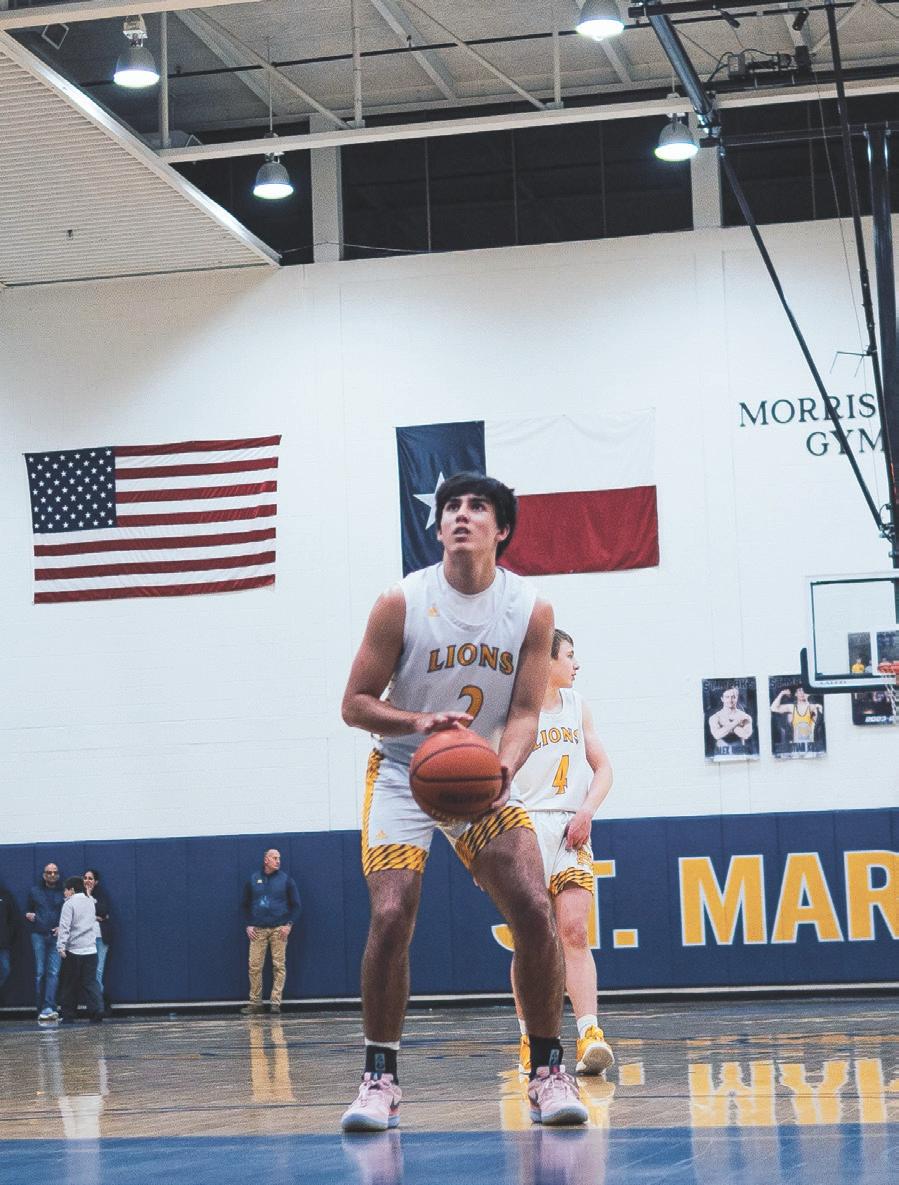
Young wrestling team impresses with strong showing, takes second
 By Vikram Singh
By Vikram Singh
With a second-place finish in the Winter SPC just behind St. Johns, the wrestling team capped off an impressive run, filled with incredible individual achievements across weight classes, with first place finishes from co-captain Quina Perkison’24, Wyatt Loehr’25, and William Taylor III ’26.
In addition to the success of many key players on the team this year, a notable addition in coaching also contributed to the success of the team’s achievements in SPC, as well as other tournaments, according to head Wrestling Coach Reyno Arredondo.
“The one thing that’s been awesome about this season is having two assistant coaches that are totally bought in and dedicated,” Arredondo said. “Having two kind of young and dedicated assistant coaches has been a big help.”
Along with the added help of coaching, the sheer number of wrestlers this year combined with their talent has also been a huge help, especially returning from last year, which was characterized by rebuilding.
“I mean, the last few years we been trying to rebuild our St. Mark’s wrestling team,” said Arredondo. “Having holes in the lineup is giving away points, but this year we were able to not give as many points away as we had been. During training, it allows everybody to have training partners.”
Like some other sports Marksmen compete in, the wrestling team does not only compete in SPC, but also a handful of other in-state and out-of-state tournaments.
“We go to some tough competition,” Arredondo said. “We see that when we go outside and compete against programs that are not in our in our private school system.But when you compete against the best guys, it only helps you out.”
Looking into the future, the wrestling team not only has lots of talent but also talent that is raw and young, setting up the program for years of dominance to come.
“We had six qualify for The Prep National Tournament — you have to be top three at our state tournament for that — and only one was a senior. That right there is a good indicator of what’s coming back next year,” Arredondo said.
Soccer team drops first game, still manages to finish fifth
By Neil Yepuri
Despite a successful regular season, and a clinching of the first seed going into the SPC tournament, the Lions soccer team rounded out their postseason with a fifth place finish.
Expectations were high due to the team’s undefeated record during the counter season, but head varsity soccer coach Corindo Martin knew that the field they faced was always going to be tough.
“I felt like this year had a lot of parity,” Martin said. “There was not going to be one clear winner — I think it was always going to be very, very competitive.”
Martin’s team experienced that parity firsthand when they were upset by St. Andrew’s, the eighth seed, in the first round of the tournament. The final score was 3-2, after the Lions took and then squandered a 2-0 lead.
“I felt like we were in a good place and looked good for the first part of the game,” Martin said. “It was 2-0 at halftime, so we were in control. Unfortunately, I just don’t think we started the second half mentally engaged.”
That perceived lack of engagement would go on to cost
the Lions, as they would go on to hemorrhage three goals in 20 minutes. The first seed, and one of the top teams in the 4A SPC bracket, bowed out in the first round.
But, in the SPC tournament’s current format, a team will always play three games. Despite being disqualified for a championship, fifth place was still on the line.
So, after a scrappy win against a tough St. John’s side, the team was set to play John Cooper for that fifth place title. Martin was especially conscious of the fact that many seniors would be playing their last game for St. Mark’s in this match.
Senior Daniel Weinstein would prove to be the unlikely hero, though, scoring his first and second goals for the team this season in a 4-2 win, which helped clinch fifth place for the Lions. This margin of victory meant that Martin was able to craft a sentimental moment for his team.
“The nice thing was we finished the game with all 10 seniors on the field at the same time,” Martin said. “So overall, I was real pleased with the boys. We went two and one, but we just happened to lose the wrong game.”
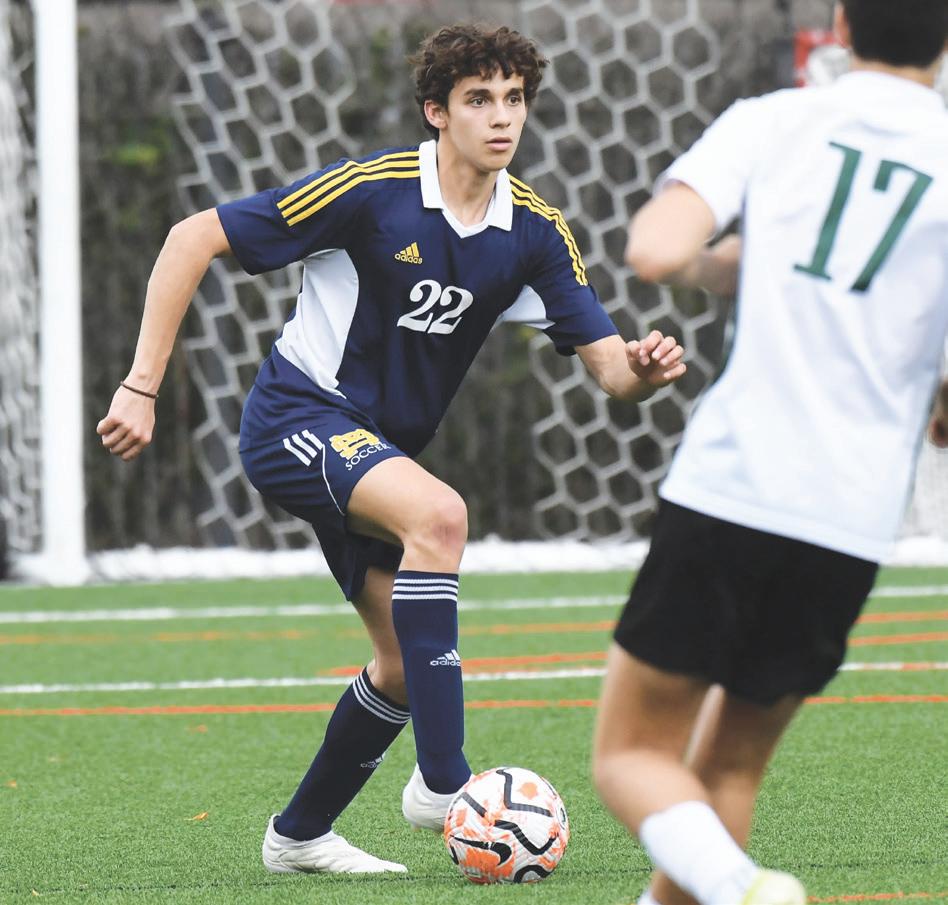
S P o R t S | R e M a R ke R Friday, March 8, 2024 | P age 27
PHOTO / ZACHARY BASHOUR
PHOTO / COURTESY REYNO ARREDONDO
PHOTO / JASMIN MA
PODIUM The Lions wrestling team takes a picture on the SPC podium, with many wrestlers wearing their medals from a successful tournament.
NOTHING BUT NET Senior CJ Ness calms his mind before shooting free throws.
TOUCH AND GO Junior Eduardo Mousinho looks for passing options as the Lions compete for fifth place.
Taking a different shot
By Lawrence Gardner and Eric Yi
Swish!
Luke Laczkowski for three!
Thwack!
Point for Laczkowski.
And one!
Laczkowski to the free throw line.
A perfect placement!
What a point by Laczkowski!
Three seconds left on the clock. Laczkowski shoots… just barely misses.
Match point. Laczkowski swings… just barely misses.
Laczkowski’s teammates rally around him on the basketball court after this tough game.
It hurts to see Laczkowski walking off the tennis court alone after this tough matchup.
“It was just more lonely,” Laczkowski said. “I loved playing both basketball and tennis, but in tennis I wouldn’t have anyone by my side to calm me down.”
Laczkowski picked up tennis in the midst of a chaotic time. With COVID ending his seventh grade season on the basketball court, Laczkowski decided to go all in on the tennis court.
“I received a 3-star ranking,” Laczkowski said. “I believe I got ranked top 30 in texas as well and was able to play in the hardcourt nationals, which is the biggest tournament for 16U players.”
To achieve this success, Laczkowski put in countless hours of work, and while it paid off on paper there was another component that wasn’t as rewarding.
“Honestly, it was really mentally taxing,” Laczkowski said. “At 13, I was putting so much stress on myself every time I messed up.”
For Laczkowski, there seemed to be a familial component that was missing. Unbeknownst to him, he would find that family on the court he had left years ago.
“I only decided to play basketball again to try and play with my brother,” Laczkowski said. “ I wasn’t sure what I wanted to do after that. I was pretty undecided throughout the whole season until the SPC tournament when we beat Houston Christian. There was a special environment for that game and I noticed how close we had all gotten. I hadn’t really built relationships like that in tennis.”
After the end of the season, Laczkowski was unsure of where to step next. He never would have guessed that the guidance he was looking for would come through an instagram direct message.
“It was a club team asking me to come try out,” Laczkowski said. “I ended up making the team and from there I saw my game continuing to improve. My goal in tennis was always to play in college, but I felt that at the rate I was improving at basketball, playing basketball in college could be an option as well.”
While Laczkowski was putting in hours of work to improve on the basketball court, part of his quick improvement came from skills he had already developed in the tennis world.
“Tennis includes a lot of footwork,” Laczkowski

said. “With me being pretty tall, my footwork was pretty bad. With tennis, I developed a foundation and it translated to basketball well. There was also a handeye coordination aspect. When I get a steal by poking the basketball out, it sort of reminds me of getting a volley in tennis. Tennis really helped with my instincts, and I sort of see the game differently because of my time playing tennis.”
Laczkowski wasn’t the only one aware of his significant improvement in such a short period of time. Others were taking notice of his potential to play at the next level as well.
“I believe he has this joy when he plays the game,” head varsity basketball coach Greg Guiler said. “As a selling point for his recruitment process, I tell coaches that this guy has only been serious about basketball for two years. He is very early in his improvement curve. I think the sky’s the limit because he really has only just started dialing in.”
Laczkowski’s decision to switch from tennis to basketball was met with support from his family as well. Though Laczkowski had reached such high levels of success on the tennis court, basketball was still a large
part of his household as both of his older brothers went on to play Division I Basketball.
“My brothers were happy when I made the switch,” Laczkowski said. “Whenever I played with them in the backyard, they would always say that if I focused on basketball I could be better than them. My parents were both very supportive as well. My mom was a bit disappointed because she loves tennis but I believe she enjoys seeing all three of her boys playing basketball now. I also think basketball is a bit less stressful for them because they have other parents they can cheer with.”
While Laczkowski loves the game of basketball, sometimes his old passion comes creeping back in and relights that lost flame.
“I was hitting tennis balls with my friends the other day,” Laczkowski said. “It was the first time I had done it in months and at that moment I kind of missed the game. I put a lot of work into tennis and it was cool seeing I still have some of that skill to this day. However, I feel that by just focusing on basketball, rather than balancing both sports, it gives me more time to try and achieve my dreams.”
SPC playoff seeding changed to better reflect 4A and 3A conference differences
By Weston Chance
The Lions athletic teams compete primarily in the Southwest Preparatory Conference (SPC) along with 18 other private schools located in Texas. At the end of each athletic season, all 19 schools gather in a predetermined host city to compete in the SPC playoffs.
And, at these playoffs, seeding serves as a critical component to the success of the playoffs.
The SPC is in just its second year of their current seeding system. However, the process really begins before the athletic season when each team from every school is placed in either the 3A or the 4A division.
“The SPC has a very unique way of dividing their divisions,” Associate Director of Athletics Josh Friesen said. “There are some schools that are always placed entirely in the 4A division based on their large enrollments, such as St. Mark’s, and there are some schools
that are always placed fully in the 3A division based on their smaller enrollments.”
While placement seems obvious for some particularly large or small schools, it becomes more complex for the group of seven schools in between who might not be as strong across the board in each of their sports. When this occurs, the SPC uses analytics to recommend the most appropriate division to teams.
“The SPC uses a matrix based on the previous two years’ results of both counter games and conference tournament finish to decide which teams within each school compete in the 3A versus 4A divisions,” Friesen said.
After being placed in the proper division, teams battle it out during the season, striving to secure a high seed in the playoff tournament. After counter play is complete, a seeding committee consisting of two North Zone Athletic Directors, two South Zone
Athletic Directors and the Conference Commissioner assembles to create the SPC rankings.
“The committee begins by using a polling system that factors in the opinions of all the coaches of every bracket sport,” Friesen said. “The committee then uses both the coaches’ poll as well as conference standings, strength of schedule, common opponents and a variety of other factors to determine the seedings.”
The SPC works hard each year to ensure the maximum correctness and fairness of the seedings. The system has not always been constant, so they are constantly striving for a more equitable process.
Even despite this impartial system, there are still some gray areas that remain.
“It’s not a perfect system because the two zones are not always equal in strength, so determining the strength of a zone can be subjective and makes the seeding process difficult.” Friesen said.
Junior Luke Laczkowski recalls his switch from tennis to basketball. Laczkowski shares his journey into stardom in both arenas and the difficult decision he had to make in choosing between the two.
P age 28 | Friday, March 8, 2024 R e M a R ke R | S P o R t S
PHOTO / ZACHARY BASHOUR
PERFECT FORM Junior Luke Laczkowski shoots a free throw versus Dallas Thunder.
Shooting for the tour
By Michael Jimenez and Weston Chance
Every April, fans of the legendary Masters Tournament dream of suiting up to play and driving down the famed Magnolia Lane in Augusta, Georgia.
One of the few given the sought-after opportunity is sophomore golfer Duff McKay, who was able to fulfill his dream of playing Augusta National because of his relentless work ethic and dedication to the game.
McKay began his golf journey at a very young age thanks to his father, Mark, and immediately discovered he had immense passion for the game.
“I got my first set of clubs when I was 10 months old,” Duff said. “I started going to the range when I was two and I played in my first tournament when I was 5.”
Throughout his career, a number of important role models heavily influenced and mentored Duff.
“I always looked up to my dad because he’s always been a good player,” Duff said. “Will Zalatoris has also been a big role model for me. I’ve seen him and all of his success, and it’s been cool to see his career on tour unfold before my eyes.”
Perhaps one of the most surreal moments of Duff’s career occurred when he was just 13 years old. He qualified for the Drive, Chip and Putt National Finals, which took place at Augusta National. There, he competed with thousands of people watching the course.
“Augusta was really cool,” Duff said, “You get to go to the practice round the next day and see all the players and get a VIP ticket for autographs. It’s a full package experience.”
Upon his return to Dallas, Duff opened a new chapter, starting to train even harder with his current private coach, Rick Woodson. Woodson has spent years coaching college and professional golfers, and he believes Duff could one day take their place.
The two have now created a strong bond, a necessity between every player and his coach.
“It’s been well over two years now that we’ve been working together,” Woodson said. “He’s a great player, a great young man and he’s got a really bright future.”
The efforts of Duff’s coaches and mentors certainly have not gone to waste. He’s implemented all the lessons and teachings into all his tournaments with a high degree of success.
“I played really well in the Junior Byron last year,” Duff said. “All the best players from Texas were there and I came 23rd out of 100, being the youngest in the field. That was a really good finish for me.”
Heading into his sophomore season with the Lions, Duff hopes to help lead the team to an SPC victory after a loss to Kinkaid in the finals last year.
“Losing last year was really disappointing, a win this year would mean a lot to me and help with my college recruitment,” Duff said.

Woodson firmly believes that Duff has what it takes to take his game to the next level, attributing his success to his unparalleled work ethic and the countless hours he has spent perfecting his craft.
“I’ve been around tour professionals since ’86 and played for a living for 12 years,” Woodson said. “I have never seen anyone work harder than Duff, including professionals.”
This summer, after the SPC tournament, Duff will participate in his first United States Golf Association tournament at Oakland Hills Country Club in Bloomfield Hills, Michigan. Duff will once again be the youngest golfer playing and will compete against numerous college golfers, but he’s looking to come home with another great finish.
“I’ve had numerous good finishes at smaller tournaments, but those aren’t as important as the big tournaments,” Duff said. “Placing well at my first USGA tournament would mean a lot to me.”
Beginning next year, Duff will begin his college recruiting process. As the 10th ranked golfer in the class of 2026 and the 40th nationally, Woodson believes Duff will earn offers from some of the top golf programs in the country.
“In five years, I see Duff being one of the most elite college players in the country,” Woodson said.
StuCo aims to put on perfect pep rallies
By Tejas Allada
From the thunderous rumbling of the student section to countless humorous moments in student and faculty mini sports competitions, pep rallies never fail to spark a feeling of school spirit for students across all grade levels.
But with such large events that house every student and faculty member of the school, a formulated approach to appropriately plan and organize an entire pep rally is imperative for it to be successful.
Under the provision of Student Council Sponsor Michele Santosuosso, the Student Council has consistently delivered creative and exciting pep rallies without fail. Because coordinating these events requires a huge effort, the student council begins their planning process by setting specific dates for each pep rally.
“We have a set plan of the dates,” Santosuosso
said. “So we know the first home football game is going to be a pep rally. Fan Blizzard is another pep rally, and it is always a night where soccer, basketball, potentially wrestling and most of the winter sports are home. And lastly, Homecoming will also have a pep rally.”
After the schedule is set, the student council fleshes out ideas for what the content of the rally will entail — consisting of any special guests or performances such as the Hockaday cheerleading team and ideas of random competitions.
“So typically before pep rallies, I’ll meet with the SuperFanMen and Student Council President,” Santosuosso said. “And then at our Wednesday student council meeting during lunch, we’ll get on the board, put our big picture ideas down and then we will break it down from there.”
Although the pep rallies intend to give the students a thrilling experience, with an average of three pep rallies every year, the repeated use of certain
ideas or themes may feel inevitable. However, because of Ms. Santosuosso’s organization of previous ideas for pep rallies, this has never become a pressing concern.
“Ever since I have been in charge of student council for the last five years,” Santosuosso said, “I have a massive Google Doc with a breakdown of every single assembly and every single pep rally, so if we just did something last year, we can try something new.”
While pep rallies have become wildly successful for the student council, Santosuosso also believes that the number of exciting pep rallies contrasts well to the seriousness in other events.
“I think we do a nice job of keeping it serious, but then also having a lot of fun,” Santosuosso said. “And so I think that’s important at a school like this. I think we have a nice balance, but I am open to anything.”
Sophomore Duff McKay recalls the highs and lows of his golf career. Recently, McKay continued his progression by qualifying for the U.S. Junior Amateur, where he hopes to further improve his national ranking.
S port S | r e M arker Friday, March 8, 2024 | p age 29
PHOTO / WINSTON LIN
TEE OFF Duff McKay takes his shot at Sherrill Park while gauging where his ball is going to drop.
Living legend steps down
To coach in any program at St. Mark's for any amount of time requires integrity and passion for a sport. But, Corindo Martin has taken that one step further. Through 34 years of service to the soccer program and 28 as the varsity head coach, Martin has made his mark on the school's athletics - and now, he's taking an earned step down.
 By Neil Yepuri and Ronit Kongara
By Neil Yepuri and Ronit Kongara
The distinct and boisterous voice of Corindo Martin will soon be confined within the walls of Centennial Hall instead of on the soccer field or in the locker room each winter.
After 28 years, Martin has decided to step down from coaching the Lions varsity soccer team to focus on his role as a math teacher at the school.
Through Martin’s lengthy tenure here, he has become ingrained within the school’s culture. He’s full of valuable lessons that have become part of his coaching style.
“I always tell the boys that wherever we go, we always leave it better than it was when we found it,” Martin said. “And so in retrospect, that's what I told the boys. I said, ‘I hope that I have left the program better than it was when I got here’.”
Martin serves as an advisor and frequents the
Pecos wilderness trip as a group leader in addition to his coaching and teaching roles.
“Mr. Martin’s an example of the ‘triple threat’ in school: teaching, coaching and camping,” Headmaster David Dini said. “Taking on a variety of responsibilities is something that we care greatly about at St. Mark’s. It’s something we believe in heavily because you want the people that are coaching you in a particular sport to also interact with you in other contexts.”
Dini also believes that Martin’s work in building up the soccer program is driven by his ability to engage with his duties.
“He’s got incredible passion for the game of soccer, and he’s got a deep commitment to every student-athlete in his care,” Dini said. “Certainly being competitive and putting an excellent team on the field is important to him, and to us, but he’s invested in every member of that team in helping them become their best self.”
Martin’s impact on the school’s soccer program is
undeniable. Whether it’s the 12 players he’s coached who have gone on to play at a collegiate level, or the 14 SPC tournament finishes in fourth place or higher, Martin’s tenure has elevated the program.
But, the team’s success wasn’t always constant. Some years, the team wouldn’t place well or go very far in the SPC tournaments. Regardless of the team’s form, however, Martin’s experiences were still valuable due to the exemplary qualities exhibited throughout by those Marksmen.
“I remember 2005 to 2008 as a period, we didn't win in those years,” Martin said. “But I have some of the fondest memories of my time coaching at St. Mark's in that group because we were always a team that was constantly improving, and the guys that I worked with were striving so hard. What we didn’t have in talent, we had in integrity and character.”
That focus on integrity and responsibility has driven Martin to the longest tenure of any SPC soccer coach and the longest tenure in a single sport as a Lions head coach. In fact, Martin has coached
P age 30 | Friday, March 8, 2024 R e M a R ke R | S P o R t S
CAREER BY THE NUMBERS
MARTIN’S
378-222-61 career record 20 win season 5 zone championships
LOOKING BACK Martin looks off towards the soccer field, sporting his iconic soccer jacket on the bleachers at Clark and Norma L. Hunt Stadium. Martin coached in front of packed bleachers here for 28 years as the varsity head coach. Martin coached here for the longest in varsity soccer, but has also coached volleyball at the school.
34 years coaching 10 top-3 SPC finishes 3 SPC championships 288 SPC matches
PHOTO / WINSTON LIN
a St. Mark’s soccer team during each of his 34 years at 10600 Preston Road as a math teacher — six as the middle school coach, and 28 at the varsity level.
Martin’s time at the helm of one of the premier sporting programs at the school has affected him massively, with multiple different aspects of the job bringing unique challenges.
“The emotional part is huge, and the mental part of being able to keep that energy going is the second aspect,” Martin said. “Planning, doing your tactics and carefully thinking about how best to utilize the talent you have. The third part is the physical part. And that’s one of the areas where it has gotten harder. I was in my 20s when I started at St. Mark’s, and I’m now in my 60s. So I don't have quite the same stamina and energy at 61 that I had at 27.”
So, while that time has been both beneficial and exhausting to him, Martin thinks it is the right moment to focus his efforts on other endeavors in his life.
“I’ve never not coached,” Martin said. “It is a huge time commitment. I can focus a little bit more on my classes. I have some goals that involve things like the AP curriculum, and just revamping some of our math curriculum. And I can focus more attention on those kinds of things and then look for other opportunities outside of school or do other things that I need to do — like spending more time with my family.”
The idea came near the end of last school year, when Martin began to reevaluate his level of commitment and ability to continue as the head coach of the soccer team.
their time playing for him.
“I’m going to miss the time with the players,” Martin said. “The time out there with the them is golden. The part I’m going to miss the most is just my interactions; some of the best relationships that I’ve developed as an adult have been with my former players. That doesn’t happen everywhere. I’m really lucky to be at a place like St. Mark's where I have those relationships and that, by and large, is what I’m gonna miss most.”
That commitment is one of the main reasons Martin has remained so dedicated to his team for the better part of three decades.
“As their coach, I tell them, ‘if I’m in for a penny, I’m in for a pound’,” Martin said. “I have to be the one who sits there and says, ‘look, if I’m asking this much of a commitment from you, then I have to be the same’.”
The level of engagement and dedication that Martin brought to the job is something that he hopes the next coach can bring to the table, continuing the legacy of motivators and dedicated people in that role.
“I hope that whoever the next person is is as committed and as passionate and as invested in the program as I was,” Martin said. “Whatever my shortcomings are – and there are plenty of them – I've never had someone who said I wasn't passionate about coaching soccer at St. Mark's.”
“WHATEVER MY SHORTCOMINGS ARE – AND THERE ARE PLENTY OF THEM – I'VE NEVER HAD SOMEONE WHO SAID I WASN'T PASSIONATE ABOUT COACHING SOCCER AT ST. MARK'S.“ -Corindo Martin
Varsity soccer captain and senior Reed Sussman knows this passion firsthand. He’s played all four years of high school on Martin’s varsity squad and has become a star and a leader on the team.
Top of the Mountain
Through his 28 years coaching, Martin has led the team to the SPC Championship three times. Each of these teams took its own unique path to glory.
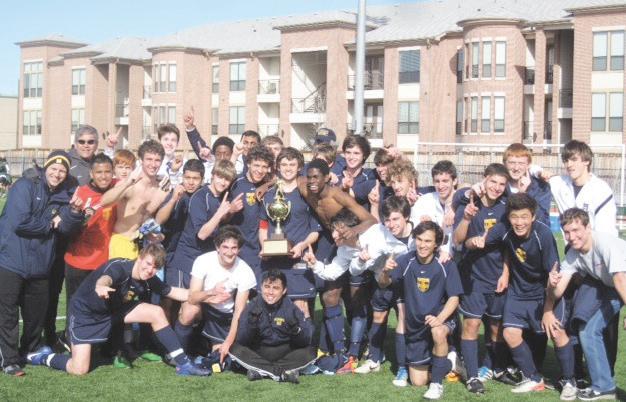
Martin's first championship came in 2012, on the back of a dominant defensive performance.
“Holland Hall allowed one goal all tournament. We allowed none. That’s why we have the trophy and they don’t,” Martin said, as quoted in the March 2012 edition of the ReMarker
“I remember the catalyst for it was probably our end of the year meetings last year as the faculty closed — the culmination of the school year,” Martin said. “And it was at the end of that meeting that it really hit me: maybe it was time to reconsider whether or not I can (continue to coach at the same level.)”
After conversations with his family and peers throughout the previous fall and winter, Martin went to see Dini to discuss his retirement from the soccer program just a day after his team battered Oakridge, 5-0.
“Very few people knew,” Martin said. “Mr. Dini knew, (athletic director Sean Lissemore) knew and (math department chair Shane May) knew, because these are the people who I have to report to. I had spoken with (assistant varsity soccer coach Jay Vuitch ’05 - I think secretly he was hoping that I would change my mind.”
Because of the emotional nature of his decision, Martin made the sacrifice of not telling his team once he knew he would be stepping down. With the SPC tournament approaching, he didn’t want to hurt his team’s stellar camaraderie or take attention away from their achievements.
“I didn’t want to add any pressure or any emotion to the situation,” Martin said. We’re playing for St Mark’s and in many ways, we’re playing for our seniors; it’s their last hurrah, right? Let’s have them go out well.”
Despite the team’s disappointing 3-2 loss as the one seed to the eight seeded St. Andrew's in the quarterfinals of the SPC tournament, they were able to turn around their momentum. They won their last two games against St. John’s and John Cooper by scores of 1-0 and 4-2 to secure fifth place.
After that fifth-place matchup and victory, Martin made the announcement to an emotional locker room.
“I just said ‘the last order of business is to let you know that I have coached my 661st game, my last game as the varsity coach for St. Mark’s’ and that I was stepping down,” Martin said. “I was really adamant about letting them know that this decision was made on the 31st of January when I met with Mr. Dini and not in that emotional moment in February, because I didn’t want them to think that this in any way reflected their performance.”
This announcement was made especially tough due to the relationships Martin has formed with his players, both during and after
“I’m grateful for the way he invests himself,” Sussman said. “If his wife wants to take a winter vacation, he says, ‘No, I gotta stay close to the boys’. He really helps us figure out how to become better men. At the end of the day, sure, he coaches us in soccer, but he also really coaches us as men and people.”
Potentially Martin’s most valuable role in the soccer progam isn’t that of a master tactician, a motivator or a manager, but as a mentor.
“He has these lessons that he just keeps saying and he leads by example with these ideas,” Sussman said.
According to Vuitch, his former player and current college, Martin’s able to inject his passion into his training sessions and everyday work.
“I previously worked for Coach Martin as a counselor at his soccer summer camps, but it was a big change to take a role helping with the SM varsity team,” Vuitch said. “It’s been a thrill, and soccer season is once again my favorite time of the year — in no small part thanks to being around Cory six days a week.”
Vuitch, who played under Martin during his time at the school, can attest to the connection that Martin is able to form with players and colleagues alike.
“He’s still a wealth of quotes and lessons, but he’s also an incredibly dear friend,” Vuitch said.
As Martin moves on from the soccer team, he’s grateful for the time he was able to spend with the boys he coached in different contexts.
“Yes, I’m their soccer coach,” Martin said. “But in so many of the cases, with the boys that I’ve had, I’m so much more. Whether it’s their calculus teacher, their advisor, or even their Pecos leader. That’s the beauty of St. Mark’s - there are all these different outlets where you get to know the boy better and they get to know you better.”
Looking back on his time as a coach, Martin leaves satisfied with his accomplishments at the helm of the program.
“It’s been a blast,” Martin said. “Coaching at St. Mark’s has been both the most rewarding and the most challenging experience of my life. When you consider doing that while you’re also being a full time teacher, it’s a lot, but I wouldn’t change it for the world.”

In 2013, the Lions went back to back, thanks to “strong contributions from senior Kareem Itani, who led the Lions in their championship run with four goals and an assist. The Lions only allowed one goal in three games thanks to strong play by defenders like Jack Fojtasek.” - The ReMarker, March 2013.
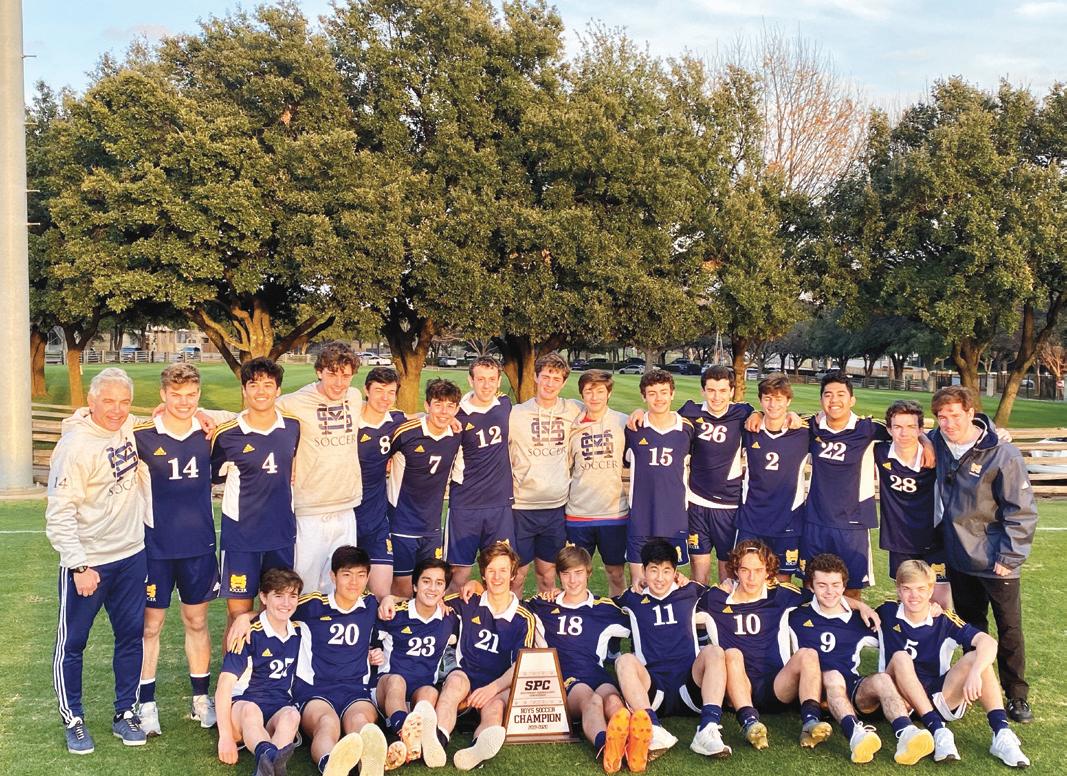
Martin's final SPC championship came in 2020thanks in large part to some penalty-saving heroics by back-up goalkeeper and then-sophomore Stefan Moreno in the semifinal versus Casady.
“I knew we were going to win that game when Stefan made that save, the one in overtime. All I said was ‘Stefan, if you save one, we win this game,’” Martin said, as quoted in the March 2020 edition of The ReMarker.
S P o R t S | R e M a R ke R Friday, March 8, 2024 | P age 31
PHOTO / COURTESY CORINDO MARTIN
PHOTO / COURTESY CORINDO MARTIN
PHOTO / COURTESY CORINDO MARTIN

RECYCLE ME
Community celebrates cultural heritage
On Feb. 28, the Inclusion and Diversity Leadership Council hosted their annual Marksmen Multicultural Night. The community-wide event included global cuisine, many performances, a game of cricket and cultural display tables.


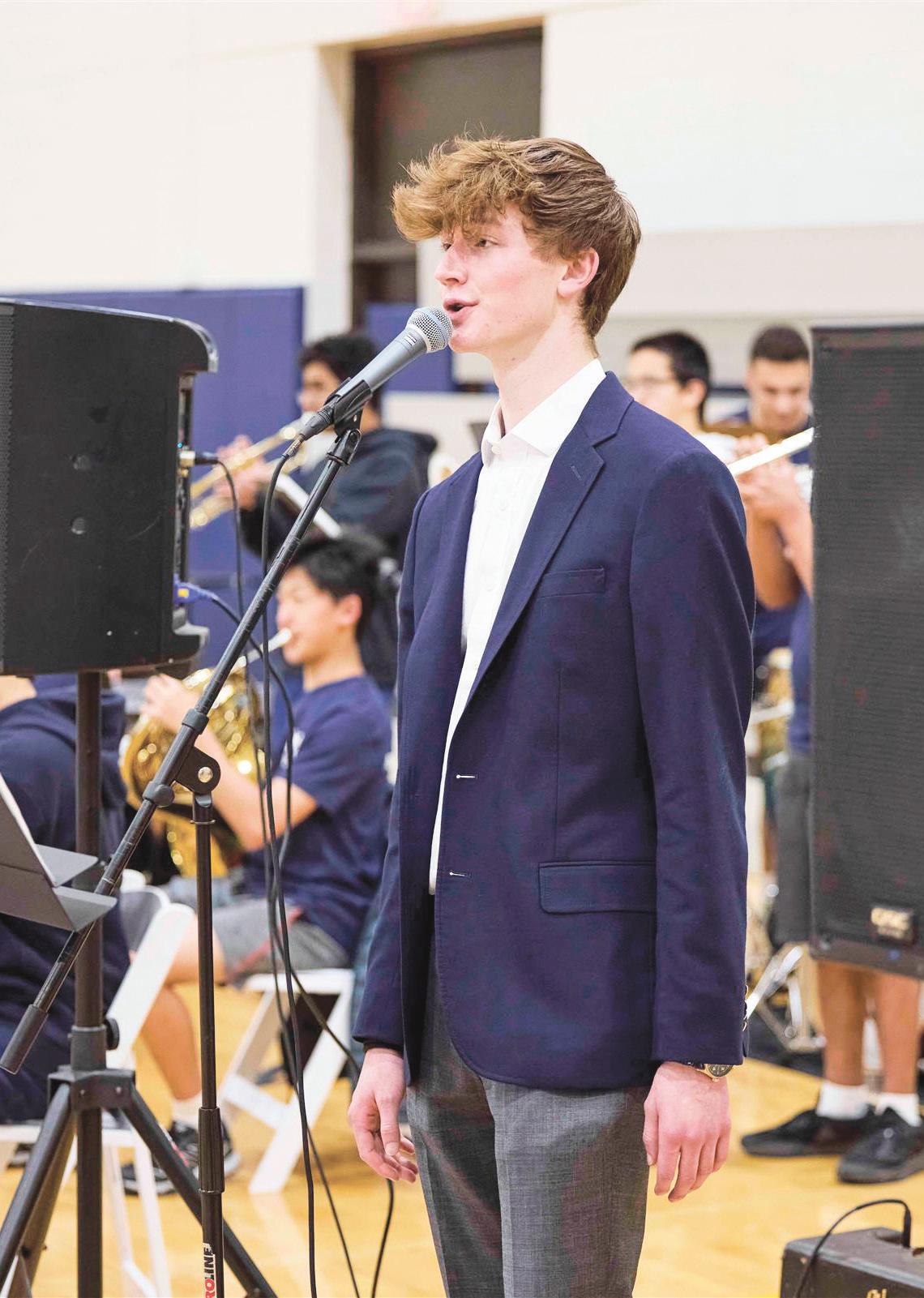
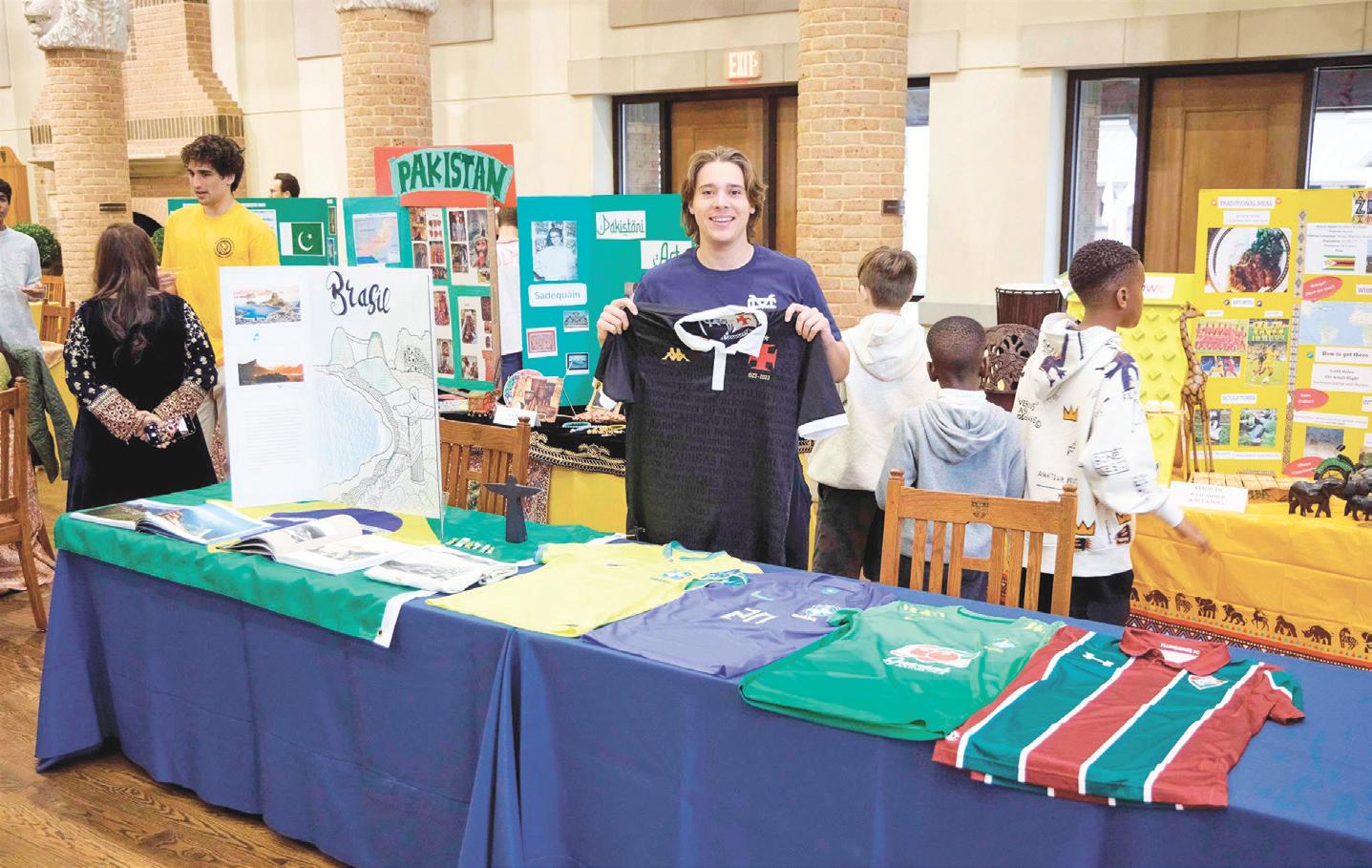
ReMarker St. Mark S School of texaS 10600 PreSton road dallaS tx 75230 P age 32 | Friday, March 8, 2024 R e M a R ke R | B ack P age
ALL IN Under the direction of spanish instructor Maria Russo, the second graders performed a song and dance in celebration of Brazilian heritage.
1 3 2
FROM START TO FINISH 1 - Seniors (from L to R) Alex Soliz, Lucas Blumenthal and Ahsan Tahirkheli take a selfie at MMN. 2 - IDLC Co-Chairs Zachary Bashour (right) and Noah Cathey (left) open the event with the help of Headmaster David Dini. 3 - Senior Winston Miller sings with the blues club and jazz band during a performance intermission. 4 - At his cultural display table, junior Nico Costa celebrates the heritage of Brazil and its connection to soccer.
4
PHOTOS / COURTESY WINSTON MILLER
PHOTO / COURTESY SCOTT PEEK




 Noah Cathey Design Director
Noah Cathey Design Director














 Joseph Sun Academics Editor
Joseph Sun Academics Editor























 By Rohan Kakkar and Ronit Kongara
By Rohan Kakkar and Ronit Kongara



 By Akash Manickam
By Akash Manickam


















 By Joshua Goforth and William Kozoman
By Joshua Goforth and William Kozoman







 Nolan Marcus Managing Editor
Nolan Marcus Managing Editor




 Arjun Poi Issues Editor
Arjun Poi Issues Editor


 Will Clifford Digital Managing Editor
Will Clifford Digital Managing Editor

 Matthew Hofmann Life Editor
Matthew Hofmann Life Editor




 By Vikram Singh
By Vikram Singh



 By Neil Yepuri and Ronit Kongara
By Neil Yepuri and Ronit Kongara







